#classic. classic parenting moves from a class act
Text
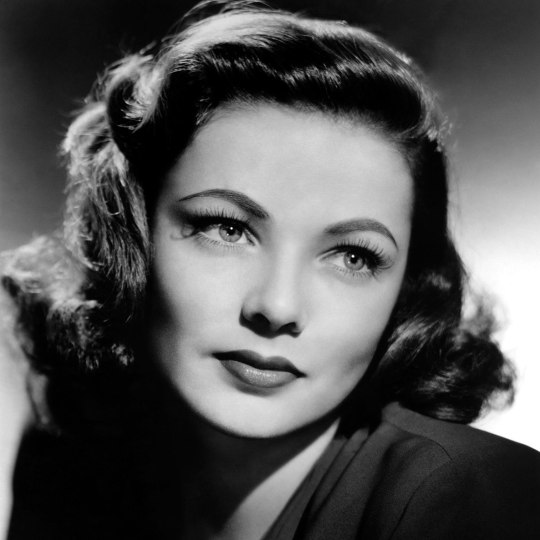
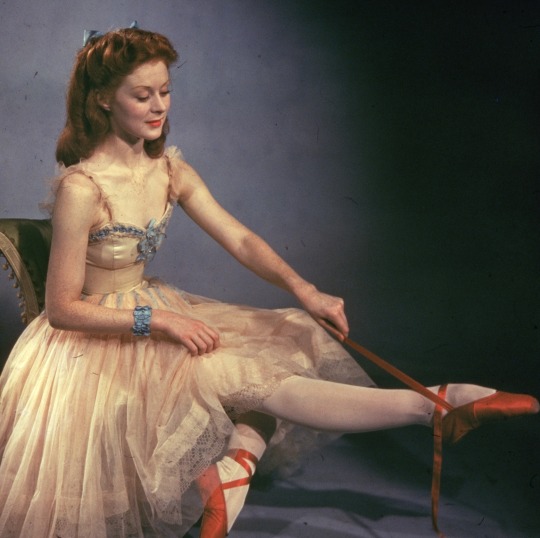
Propaganda
Gene Tierney (Laura, The Ghost and Mrs Muir, Leave Her to Heaven)— The class, the elegance. The way she walks into frame and immediately all focus is on her. She had a pretty lengthy struggle with mental health that she describes in her book, which I think made her all the more sensitive in portraying characters like in leave her to heaven. Also she dumped JFK so
Moira Shearer (The Red Shoes)— Moira Shearer is one of the most awe-inspiring dancers ever put to screen. Watching her performance in 'The Red Shoes' changed my fucking life. When I saw her in 'Peeping Tom' it was one of the most anxiety-inducing experiences I've ever had watching a film. Moira Shearer was not only an actress who can make you feel, she's an actress who can make you feel *desperately afraid* for her. An all-time favourite for horror, dance, and just her /presence/, man.
This is round 2 of the tournament. All other polls in this bracket can be found here. Please reblog with further support of your beloved hot sexy vintage woman.
[additional propaganda submitted under the cut.]
Gene Tierney:
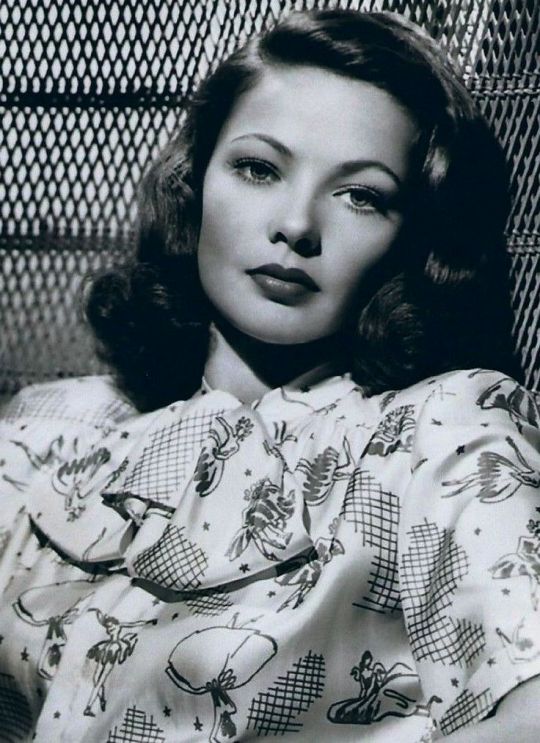
The entire plot of Laura is that a guy has to become completely obsessed with a woman after just seeing her portrait. This only works because Gene was cast in the role. I 10000% believe anyone could fall in love after seeing her face.
Those eyes! Just look at those eyes! She’s at her hottest in Leave Her To Heaven— I literally want her to ruin my life.
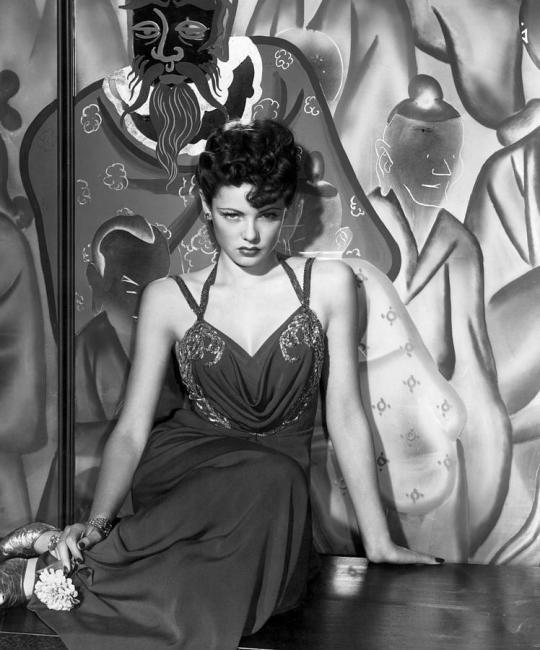
Absolute grade-A babe, she is the perfection incarnate.
Gene Tierney was beautiful, poised, intense. I associate her with roles where she was murderous or an intelligent woman being patronized to - like a woman on the edge! As far as I am concerned, she deserved to do whatever she wanted.
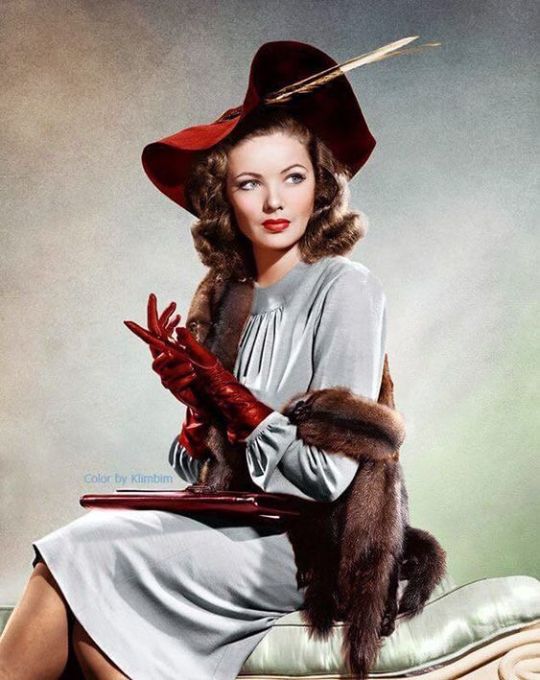
She had a slight overbite which was amazingly sexy, and a throaty voice that was very memorable as well. She’s terrific in Laura, which reminds me I should watch it again.
EYES!! Her diabolical acting in Leave Her to Heaven is just perfect, Rosamund Pike definitely took notes for her Gone Girl from her.
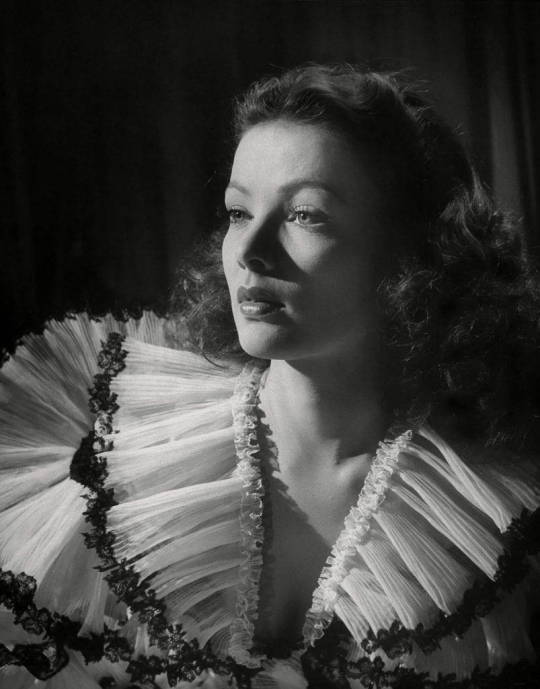
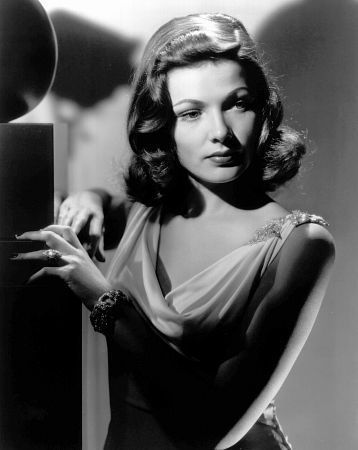
Oscar-nominated and simply one of the most beautiful women to ever walk this Earth.
Absolutely stunning. In Leave Her to Heaven, she reaches Rosamund-Pike-in-Gone-Girl levels of “holy fucking shit?!?!?!” She had a fling with JFK in the ‘40s and also dated the exes of Rita Hayworth and Hedy Lamarr (Prince Aly Khan and W. Howard Lee, respectively). Sadly, her daughter was born with a disability (during a time in which there were few good mainstream options for disabled children and their parents), likely because of a fan who was sick with measles and went out of her way to meet Tierney (who was pregnant) anyway. Topical! Sure would be good if people stayed home when they were sick! Anyway, she was also a Republican, which sucks. Laura and Leave Her to Heaven are great viewing though.
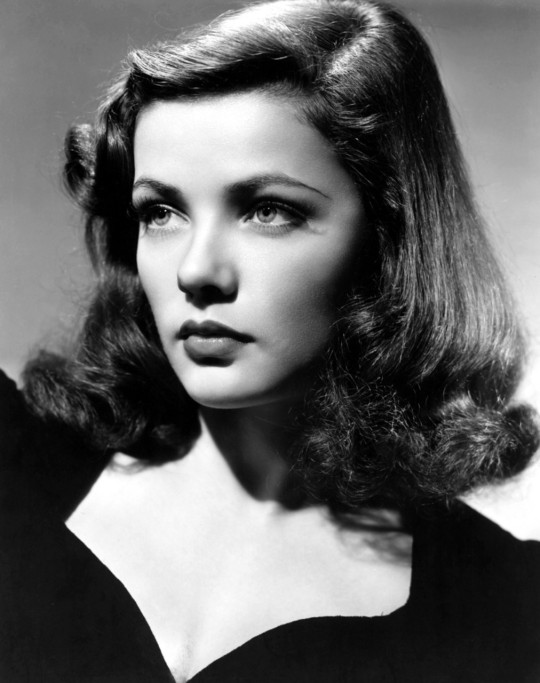
Moira Shearer:
[editor's note: if your TWs include death, body horror, or general freaky stuff, go forward with caution with the videos. Enjoy!]

Scottish flame-haired professional ballerina who made a successful move into films with ballet classic "The Red Shoes" and several other films. The best way to convey her beauty and grace is to see her in motion so gifsets are attached.
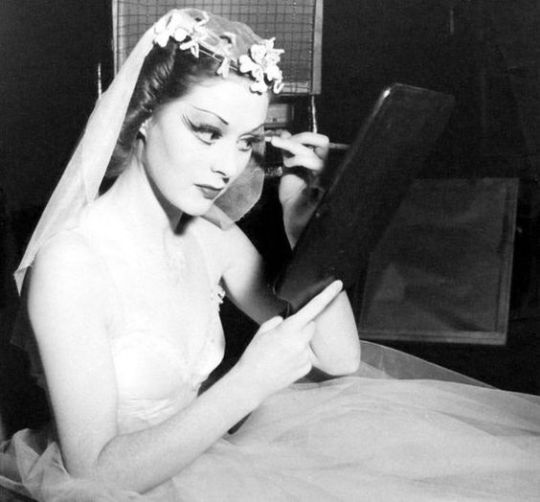
Gifset 1
Gifset 2
Gifset 3
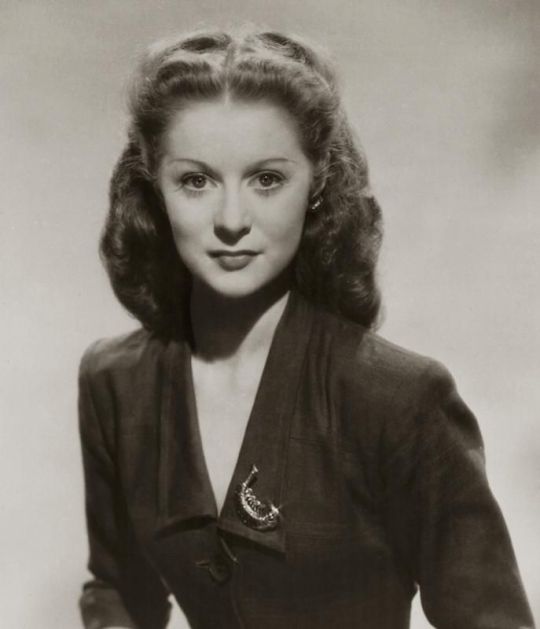
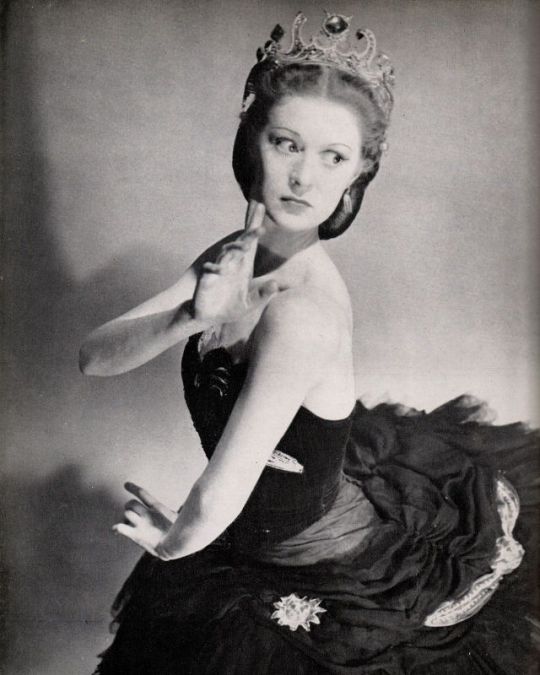
Please check her out as Olympia in The Tales of Hoffmann, it's one of my favourite examples of automata ballet and she's so awesome in it
youtube
Her performance in 'The Red Shoes' (if you ever have the opportunity to see this on the big screen, TAKE IT.)
youtube
145 notes
·
View notes
Note
I saw one of your requests of the M6 as college students and my cringe self who loves high school/ college AUs got an similar idea 🙌 could I get a mini hc about how the M6 would act if they had the classic high school crush on someone?
The Arcana Mini-HCs: M6 with a highschool crush
Julian: not sure how to approach you, just knows that he wants to. more likely to make friends with your group, wait until he has a chance to be a hero, and then wince when his voice cracks
Asra: the type to make their own space/presence as appealing as possible and then leave it to you to make a move. still makes his affections obvious by passing you little doodles in glitter pen
Nadia: so excited for a potential connection and so unused to connecting that all you get is a firm "I'm tutoring you today. Don't be late" before she flounces off around the corner and turns bright red
Muriel: very, very confused, because his heart did a 180 and is now heading towards a person instead of away from them. you become the only one he doesn't glower at in the hallways between class
Portia: she is going to win you over with the power of love, friendship, and snacks. quickly figures out what all your preferences are and starts keeping your favorite things on hand until you fall for her
Lucio: a jock by parental pressure, a theatre kid at heart, he's going to loudly sing his own praises whenever you're around and then approach you like a kicked puppy when you don't ask him out already
#ask arcana brainrot#the arcana#the arcana headcanons#the arcana hc#the arcana game#asra the arcana#julian the arcana#nadia the arcana#muriel the arcana#portia the arcana#lucio the arcana#asra alnazar#julian devorak#nadia satrinava#muriel of the kokhuri#portia devorak#lucio morgasson
128 notes
·
View notes
Text
I hate you more! | Rodrick Heffley x Reader
Author's note: So not sure if people still read Rodrick Heffley fics but I had this idea (and could not find something similar that's already written) where the reader decides to sabotage Rodrick from getting it on with Heather. Reader is at the top of the highschool food chain and is friends with Heather, but hates Rodrick so she sabotages him. A classic enemies to lovers!
Part 2, Part 3
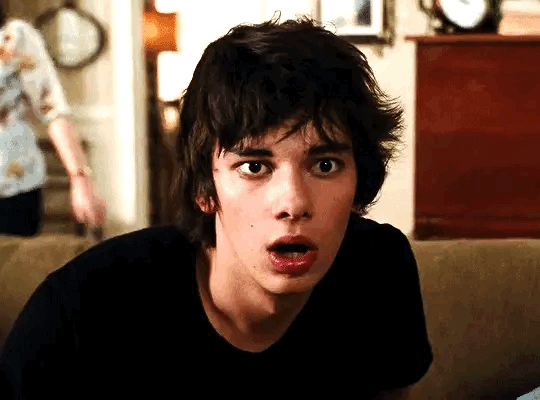
You feel like you've been living a double life. You get straight As because, well, your allowance is tied to your grades. But what most people don't know is that you typically sneak out at night to hang with your boyfriend. Well, ex-boyfriend. You smoke, you party, you skip town without your parents ever knowing. But during the day, you looked like someone who goes to church every Sunday. In fact, you're quite impressed at how you're handling this double life. You learned, at a young age, that all there is to life is observing the people around you, and using those observations to your advantage.
Well, you thought to yourself, it's time to test these theories all over again as you move into a new town, new school, new classmates, and new friends. Unfortunately for you, your new neighbor doesn't seem to grasp the idea of a nice and quiet Sunday morning. You decided to pay them a visit, and maybe remind them that their garage isn't soundproof enough for the noise coming out of it.
You walked up to the door and gave 3 loud and firm knocks, waited a couple of seconds until you hear footsteps.
You expect the mom to open the door, which is why you brought cookies as a means to be a good new neighbor but you were greeted by a tall and dark-haired guy with eyeliner. He eyed you up and down in frustration before landing his gaze on the plate of cookies in your hand.
"What do you want?"
You forced yourself to be civil. "I just came here to give you cookies. We just moved in next door when I heard this sound coming from-"
"Yeah yeah, thanks for the cookies!" And with that, he slammed the door in your face. The audacity! You scoffed and started to walk away. The noise had not died down, and you walked away not believing how rude and ill-mannered your new neighbor was. God, if it means hearing this noise every weekend, you might beg your parents to move again.
~
First day of school. You were pretty confident with your social skills so highschool is a cake walk for you. Living a double life means you ought to know how to act in certain situations.
First period. You were introduced to the whole class. Your introduction was amazing. Everybody loved you. You had come into that room, dressed to impressed, and you even cracked a joke that made everyone laugh. Well, everyone except for your neighbor who's in all of your classes by the way. He was too busy talking about his band to basically anyone who's not deaf. What's worst is that you're sitting behind him.
Because of your peak social skills, you were sitting with Heather that day for lunch and apparently, they're at the top of the highschool food chain so that works for you too. You also learned that your neighbor, Rodrick, obviously had a crush on Heather. Since you sit behind him, and Heather sits beside him, you have observed all of the tell-tale signs that he's desperately in love with her. You smirked at the idea, and the endless possibilities of making his life a living hell.
~
School bell rang and everyone hurriedly packed their belongings. Heather asked if you wanted to go to the mall. You agreed and she told you to meet her upfront. Rodrick obviously heard this, and based from his expression, he was surprised that Heather and you are that close already. When everyone had left the room, you called out to Rodrick to set your plans of destroying his life in motion.
"Hey"
"Heyyy," he asked, curious why you were talking to him after he slammed the door in your face. He decided that it would be nice to at least be on your good side since you're friends with Heather so he started with an apology, "Listen, about what happened, I'm sorry but Sunday is the only time I can practice with my band. It's hard work, you know."
You smirked at his half-ass apology but mostly because you can see right through him, but you had a mission, "Oh don't worry about it! Actually, I wanted to tell you that Heather has a message for you."
As soon as you mentioned Heather's name, it was like something inside him had turned on. "Yes?"
"She's too shy to tell you this herself but she kinda has a crush on you. But she can't be too obvious because you know, in dating, guys make the first move, right?"
"Yeah," he said trying to comprehend every word you just uttered.
"Yes, so she doesn't want to go out with someone who did not officially ask her out. You know?"
"Yeah!" He said again as if he had solved a puzzle in his head.
"Okay, so tomorrow at lunch, why don't you "officially" ask her out?"
"Yeah?"
Jesus. You couldn't comprehend how slow this moron is in front of you. You were practically spoon-feeding him. You decided to repeat what you said just to make sure he gets it.
"Tomorrow. At lunch. Ask Heather out?"
"Yes. Okay, I can do that." He said trying to hype himself up.
You walked away feeling good about your plan when you decided to add one final touch to it. You looked back and called out to Rodrick.
"Oh, and don't forget, Heather looooves grand gestures!"
#diary of a wimpy kid#rodrick rules#rodrick heffley#rodrick heffley fanfic#rodrick heffley fluff#rodrick heffley x you#rodrick heffley x reader#rodrick heffley x y/n#loaded diper#devon bostick#I hate you more
322 notes
·
View notes
Text
Prof. Rose AU Concept
To be clear this isn't the only Au/ comic I'll put the model in but it is the one that comes to mind for me most often.
All of team RWBY are born into the previous generation.
Ruby would've never thought of herself as the teaching type of Huntress and yet here she was in Beacon showing students how to Huntress with the best of them.
So yeah she was a bit late to the classes she taught, and liked to dress... Um, a bit messily BUT THAT WAS HER METHOD GOSH DANGIT!
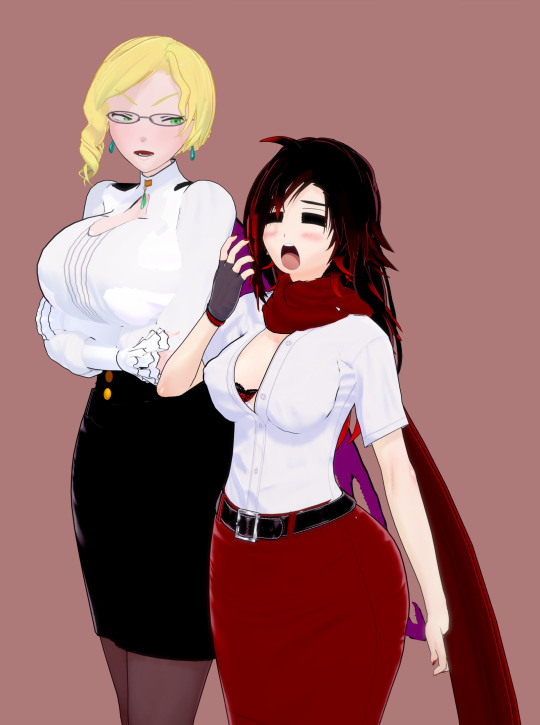
Besides she was a adult, and a awesome one at that. Heck Gynda barely ever scolded her... Anymore.
Today was no different either as she walked to the auditorium. Near the launch pad, watching as new students came flocking out looking around with stars in their eyes and hope in their hearts.
She remembered being like that back then... Okay, maybe not like that one blonde blowing chunks into the garbage can but still.
A bunch of Weiss's Dust packed, she was Enough reminiscing she had stuff to do like being a awesome partner, moving her friend's Dust to their room. Now she didn't need to pay extra for them to navigate Beacon and, and, ACHOO!!!
'Boom!'
What Was This Place Cursed!? Really? the same spot she blew up I on her first day her all those years ago!
At least she didn't have a fuming Weiss to deal with this time again... Right now.
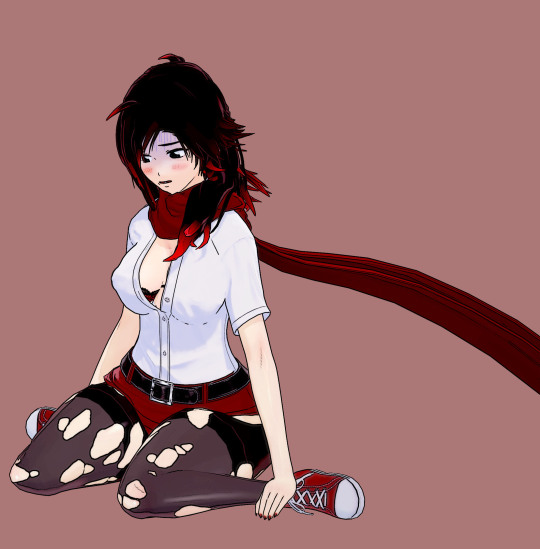
She sat there sulking remembering back then to. That'd nearly broken her back in the day. But she knew better now, nobody would come to help he-
"You okay?" She blinked, looking up and meeting gazes with a boy.
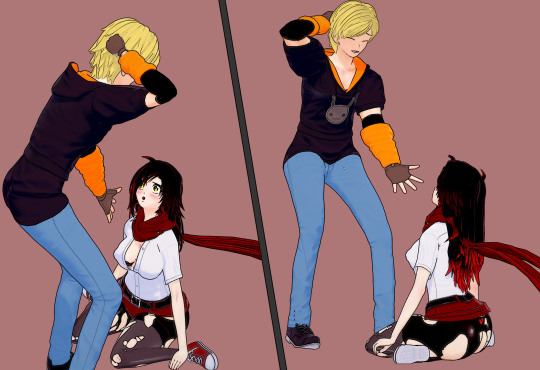
"Aren't you the guy who blew chunks in the trash?" And like that she'd instantly insulted one of her students and a nice cute one too... Wait, cute?
"Hey I have motion sickness! It's a common problem that a lot of people have." They walked through the school, him quick to follow her lead. The boys name was Jaune, obviously he was a first year.
And he wielded a classic bastard sword with a mecha-shifting sheath/ shield. Nothing fancy but the metal was like freakishly durable and seemed immune to rust! She'd admit to drooling over the thought of what she could make with a alloy like that.
Oh And Jaune Was A Arc!
A Actual Arc! To most people that wouldn't mean much, heck to hear even just a few years ago it wouldn't mean much. But now that she and her team were Part of Ozpins super secret decret circle she knew better.
Jaune came from a long line of heroes, heroes who fought against Salem and in just about every war you could look up. Heck one of the two people exemplified on the statue were a Arc!
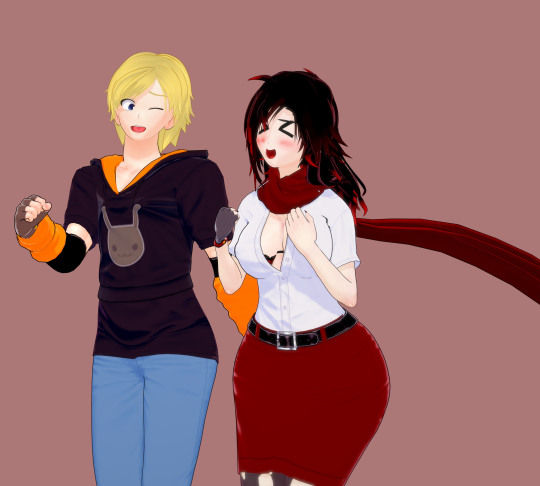
Yep Jaune was gonne do great, awesome things, she just had a gut feeling about these sorta things. He even got that she was older then him! And with her baby face that was saying something!
Though admittedly he did only think she was a senior, but still. Jaune was hitting every box to being her favorite student this year. She was so excited she was gushing about her new friend to Glynda and the rest of the staff that night.
Still if Jaune was gonna be her new favorite student she wanted to know everything about him she could. Some research was in order... And he cheated his way into Beacon...
Cool, and here she was expecting worse like him being a former terrorist or bandit like Blake or her uncle Qrow. He just never went to combat school.
That wasn't so bad, he probably had the basics down and could he taught the rest. Yep, everything would be A-Okay!
-0-0-0-
EVERYTHING WAS NOT A-OKAY!!! Heck It wasn't even C-Okay! It was F-Bad! Real Bad! Jaune Didn't Have Aura! Nope Nadda! HOW!?
What Kinda Parents Didn't Unlock Thier Kids Auras When They Wanted To Fight Grimm!
Thank God Pyrrha There... Touching his chest, unlocking his aura... One of the most intimate acts you could share with another person...
Huh? She, she didn't like that... At all. Though there were some hiccups Jaune and his team managed to pass, with Jaune leading it... Yeah she was getting flashbacks to her first year.
The party started and his team was the center of attention or to be more accurate Pyrrha and very very much not normal knees. Good thing Jaune seemed to catch on quick cuz he quickly took the lead and acted like a buffer between her adoring fans. And now Pyrrha was blushing as she looked to him.
Did she like him... No.
No no no no NO!

Okay, so maybe she had a few drinks, but she was a adult so it was fine... Besides the drinks just made Jaune look yummiest after all... Yummier?
She dragged him off for super secret team leaders advice that none of the other leaders needed. Why would they?
Nope Jaune was her friend and student, which meant she won, Pyrrha was just his partner.
So they talked, about how imitation went, about his family (And geez what a family) and what he wanted to be... Like her? Her?
"Yeah, I looked some videos up and figured out you were some kinda hero Craterfac-, I mean Ms. Rose.
Nope! She did not like that! And refused to let it stand. And when he dared to refuse her refusal she decided force was needed and tackled him down.
Pinning down her new friend/ student she threatened him to start calling her Ruby again like all her friends only to freeze up. Becaus something was pushing up against her. Something big and hard, and in Jaune's pants... Oh!
And like that he was off, rushing away with a absolutely tomato colored face. And she was left there, everything clicking in her head and tingling in her body... Oh, so she had a crush on Jaune...
And didn't that present a problem, Ruby Awesome Rose had butt tons of experience in a lot of stuff.
Fighting Grimm, Weapon Repair, Baking... But romance was very much not her field. And Weiss and Yang were nowhere in sight to ask for advice. Well, at least there was once source of study she had available on hand.
Thank Oum for Blake and her books, she was sure they'd make Great references material...
And great they did, especially with a drink or two... Yep Jaune could definitely be like these studs and... Heheh and do fun stuff to her.
Actually 'Hic' why did she never think about making babies? She was a grown woman, and Jaune she could chisel into a super hunky knight.
Yeah, the more she thought of it the better that idea got. And drinks made the plan all the sexier. utterly sloshed, she worked another orgasm off of watching a teacher student porno, and found herself quite annoyed.
Why was she using this? There was a cute dork who just passed Initiation AKA was totally and utterly legal.
Her mind made up she whipped out her Scroll and made her way down go JNPR's room. Knocking on it, waiting for someone to answer, for 'Him' to answer, the door opening her prize came half confused as and all flustered as he readied to speak. But she didn't let him, after all she wanted a taste really bad...
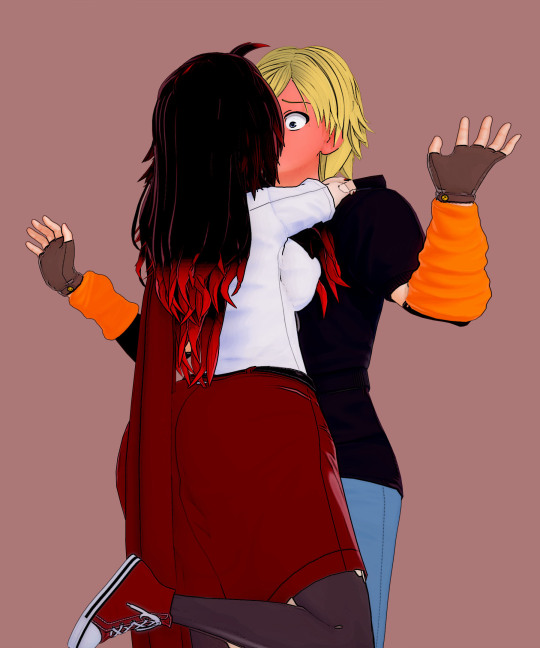
Lips smacking she pulled back and found him landing flat on him ass face red as a tomato and pitching a new tent.
Her drunk mind worked a lightbulb and she smiled. .
That was just the sorta reaction she wanted, she would pressed on, already getting ready to pull down her top but she could hear the familiar sound of Glynda's heels as she made her way there.
-0-0-0-
Jaune was flustered, not sure how he was gonna face Prof. Rose, yep, Professor, Ruby as it turned out wasn't just some quirky fourth year student. Nope, his dumb butt went and made buddies with his teacher... He could already hear the bullies cracking their knuckles. That team CRDL group had been bugging him ever since, but somehow that wasn’t even the worst of it. Nope, the worst was Ruby herself, well… What she did while drunk…
His cheeks pinked, still vaguely recalling the taste of strawberries… He really needed to clear the air, he knew asses who tried to take advantage of his sisters when they were drunk and he had no intention of falling in with that lot.
All he could do was try to clear the air with miss Rose and hope she would be understanding, she might’ve kissed him but he did lean into it instead of rejecting it. So even if others would argue it he felt guilty… Still he was in his first class here and she was gonna teach it, fingers crossed she wouldn’t hate his… His. Sexy… Wha!? No he meant what was she wearing!?
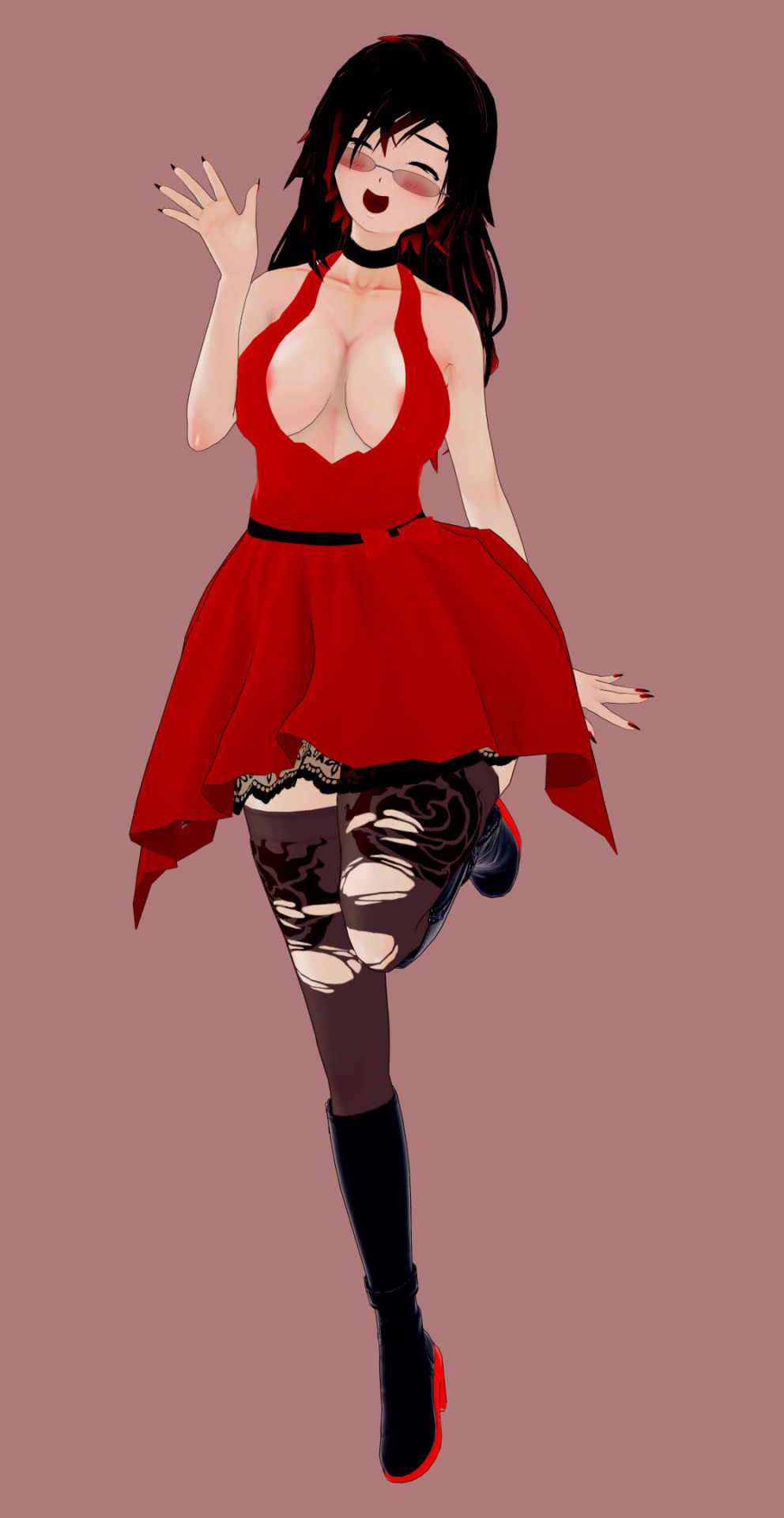
-0-0-0-
One awesome thing about having a Drunkle Qrow was that Ruby Rose was a expert drinker, highly adapted and incredibly quick to bounce back. AKA no hang overs and a crystal clear memory… And oh did she make great memories last night!
Hehe, he tasted like honey, and his face got all red, she bit her lip thinking about it, okay so yep Ruby Rose had it bad. And usually she might hesitate, but Drunk Ruby had nailed the assist! And now Ruby knew Jaune was interested and that she wanted it!
Oh she panicked at first, but then looked up the rule book and yeppers it was all cool and legal! Heck her dating Jaune wasn’t nearly as bad as half the stuff her team got into back when they were students!
Maybe when she was a freshman she might’ve panicked, have second guessed herself… But that was then, she’d gone through to much, to many difficult experiences to be thwarted by romance… Mt. Glenn… Dr. Merlot and Salem’s sinister circle and the Hunters disappearing in Mistral. Ruby Rose had faced death and danger on scales most hunters would never know.
And from them she’d learned above all else the value in being decisive, and Ruby Decisive Rose had a new goal! And that goal was a blonde young knight husbando! Mark her words! Ruby Rose was Gonna get herself a man! And Jaune Arc didn’t stand a chance!
She would use all the knowledge and know how of Blake’s many smutty books, and years observing her big sis flirting to her full advantage! She was no longer a member of the itty bitty boobie club dangit, she had Ruboobies to match her Bubooty! And she was gonna use it to it’s full effect!
And Ozpin was all for her making some Silver Eyed Babies! Which meant Jaune Arc was as good as her’s! Ruby Rose had it going on and every student in the class had their eyes on her in her sexy dress including Jaune!

Operation Lancaster Start!
285 notes
·
View notes
Text
Discworld Pushed Me Left
by Steven Young
Thanks to the marvelous editor, Lyta Gold.
[Originally published in Current Affairs, (before the purge)]
It took Hannah Arendt two books and 800 or so pages to describe the origins of totalitarianism and the banality of evil. Terry Pratchett did it in 326 words when describing the workplace culture of the religious torture chambers in his book Small Gods. Karl Marx spent many chapters in Capital describing how the rich fleece the poor; Pratchett boiled much of that down into the 169-word “‘Boots’ Theory of Socioeconomic Unfairness” in Men At Arms. By using humor to poke fun at the world that he created, Terry Pratchett made many progressive and leftist ideas accessible, explainable, and shareable. And his Discworld series helped move my political outlook leftward in a way that not many other things could.
I grew up conservative in the way that many middle-class suburban religious white kids are conservative. (“We’re fine, right? Everyone else must be fine, then. If not, it’s their fault.”) My father was a career Army officer and my mother had been in the Army during Vietnam. As adults, they both joined the Church of Jesus Christ of Latter-day Saints (Mormons). That’s why I served a mission for two years in Brazil (for my Church), and why I joined the Marine Corps, serving my country (I thought, lol) for 12 years. You would think that being a religious colonizer, and a veteran in the “War on Terror” would have cemented my conservativeness, but the most important thing I inherited from my parents is silliness. I am a very silly person, and am more strongly influenced by funny things (comedy, light-hearted fiction) than serious things (pundits, war). Conservative comedy, I realized as I matured, wasn’t particularly funny or clever, since it consisted mostly of racism and bullying. In watching, listening to, and reading comedians who critiqued society and its institutions, rather than just mocking people, I began to see the weak points in my inherited conservative views. Then I found the Discworld, and was changed forever.
Terry Pratchett’s 41-novel Discworld series describes a place of barbarian heroes and hapless academics, brave witches and cowardly Wizards, silly kings and evil fairy godmothers. There are magical flying dragons, and domesticated swamp dragons with a propensity for inadvertent self-immolation. You’ll also find plenty of politics, as well as war, inventions, grifting, intrigue, love, danger, and DEATH. (On the Disc, Death is no mere abstraction, but an anthropomorphic personification with a voice like “the lid of a sarcophagus slamming,” who is really quite likeable.) Perhaps more than anything else, the Discworld has humor. Every page is full of puns and other wordplay, clever rejoinders, and silly situations. Pratchett’s stories are often laugh-out-loud funny and at the same time incredibly insightful, often by using a silly situation to show the inherent silliness of many things in our world.
In his book The Truth, about the invention of the newspaper, Pratchett writes that “People like to be told what they already know… They get uncomfortable when you tell them new things… They like to know that, say, a dog will bite a man. That is what dogs do. They don’t want to know that a man bites a dog, because the world is not supposed to happen like that. In short, what people think they want is news, but what they really crave is olds.” Pratchett often gets the reader to think about “the news” by referencing “the olds,” re-telling classic stories from a different perspective to challenge their established values. For example, in Witches Abroad (Discworld #12, Witches #3), the young witch Magrat Garlick is given a magic wand, and told that she is to act as fairy godmother for a young woman named Emberella, an obvious play on Cinderella (both in name and, as we find out, in the story). After many adventures on the way to find Emberella, Magrat discovers that there is another fairy godmother who is “helping” Emberella by trying to force her into marrying a handsome “Prince” (who had until very recently been a frog, and still thinks he is one). The book hinges on Magrat and her fellow witches competing with this other fairy godmother by trying to help Emberella figure out if marrying the handsome prince is what she really wants. The entire story, in fact, is premised on what happens when powerful people (in this case, powerful magic users) try to impose their idealistic stories onto the lives of others.
Pratchett’s 41 novels are dense with literary references, and are hilariously critical of just about anything one could be critical of. I do not have enough space to give the incredibly broad scope of the characters and places of the Discworld the discussion they deserve, so I will focus for now on the biggest city on the Disc: Ankh-Morpork. That’s right, “Ankh-Morpork! Pearl of cities! This is not a completely accurate description, of course—it was not round and shiny—but even its worst enemies would agree that if you had to liken Ankh-Morpork to anything, then it might as well be a piece of rubbish covered with the diseased secretions of a dying mollusc.” Ankh-Morpork can be likened to immediately-pre-industrialization New York City and London, and many of the problems in the stories arise from the growing industrialization of the Discworld—such as urban blight, policing, corruption, organized crime, innovation, monopolies, and lack of funding for public services.
The government of Ankh-Morpork can be described as libertarian, more or less. The city of millions is ruled over by the Patrician, whose role is, as he understands it, to ensure that everything works. “Ankh-Morpork had dallied with many forms of government and had ended up with that form of democracy known as One Man, One Vote,” Pratchett writes in Mort. “The Patrician was the Man; he had the Vote.” The Patrician, Havelock Vetinari, doesn’t rule Ankh-Morpork with an iron fist: he just lets everyone go about their business, and then rigidly holds them accountable. That said, his real power comes from his ability to influence people by sheer foresight and incredibly detailed planning. In fact it was Vetinari himself who instituted a new type of “justice” system. He legalized the Guild of Thieves:
“Crime was always with us, he reasoned, and therefore, if you were going to have crime, it at least should be organized crime...[I]n exchange for the winding down of the Watch, the [Thieves Guild] agreed, while trying to keep their faces straight, to keep crime levels to a level to be determined annually. That way, everyone could plan ahead… and part of the uncertainty had been removed from the chaos that is life.”
I can imagine certain libertarians trying to explain how paying a predetermined amount to the Thieves Guild in exchange for a receipt and future protection is different from paying taxes, but you and I both recognize that that argument would be nonsense. By taking the concept of “organized crime” literally, Pratchett exposes the baselessness of the libertarian idea that freedom can be found through just legalizing everything and resolving all conflicts through contracts. Arrangements like these don’t make people any safer, and no matter what, they still result in powerful entities charging citizens money for protection.
The societies in Discworld are pre-industrial, as I said, with some later going through industrialization, and for that reason there is little governmental regulation of housing, industry, commerce, and the environment. The water in Ankh-Morpork is described as having a “thick texture,” “too stiff to drink, too runny to plough” and smelling like “several armies had used it first as a urinal and then as a sepulcher.” Any urban planner will tell you that environmental degradation, among other things, leads to urban blight: Ankh-Morpork is squalid and dangerous. As Pratchett writes in Pyramids, there “was not a lot that could be done to make Morpork a worse place. A direct hit by a meteorite would count as gentrification.” For all the danger and organized crime, “murder was in fact a fairly uncommon event in Ankh-Morpork, but there were a lot of suicides. Walking in the night-time alleyways of The Shades was suicide. Asking for a short in a dwarf bar was suicide. Saying 'Got rocks in your head?' to a troll was suicide. You could commit suicide very easily, if you weren't careful.” There’s a sly joke in here about crime statistics, and how technical terminology can be used and misused to tell a certain story. Relatedly, the Assassins Guild in Ankh-Morpork doesn’t commit “murder”; instead they merely “inhume” their victims, but they keep detailed records of their work and come down very hard on unlicensed inhumations. The state of policing in the United States is so horrible that perhaps, if we had a strong Assassins Guild, it would be an improvement; sure, murder would be officially legal, but in the guild system it’s costly to hire an assassin and costly to be an unlicensed assassin, whereas in the United States the police often do the assassinating themselves. At least in Ankh-Morpork the Assassins Guild school provides one of the best and well-rounded educations on the Disc, with scholarships for need-based students. This is partly out of noblesse oblige, but mostly because the experienced assassins know how important it is to keep an eye on youngsters with an aptitude for the profession. (Yes, to some degree this sounds like the current school bully-to-cop pipeline, but at least Pratchett’s assassins are held accountable.)
Criminals in Ankh-Morpork are often just referred to as ‘entrepreneurs,’ and at the start of the Discworld series, the city doesn’t have much in the way of a law enforcement system. Due to Vetinari’s re-organization of the Guilds into self-enforcing crime causing and prevention, an official law enforcement body was seen as superfluous. For that reason, early in the Discworld series the Night Watch has only three very ineffective police officers. To leftists like me this may sound great, but as discussed above, Ankh-Morpork’s methods of criminal self-enforcement coupled with unregulated markets makes for a pretty terrible place to live. The three officers of the Night Watch—Captain Sam Vimes, Sergeant Fred Colon, and Corporal Nobby Nobbs—have three different takes on policing (all of which might be called a sort of “anti-policing.”) In Making Money, Pratchett writes that “Colon and Nobby had lived a long time in a dangerous occupation and they knew how not to be dead. To wit, by arriving when the bad guys had got away.” Sergeant Colon was the type of policeman who would say that “trying to keep down crime in Ankh-Morpork was like trying to keep down salt in the sea…” and would avoid having to interact with criminals by proactively guarding very notable city locations because “[o]ne day someone was bound to try to steal the Brass Bridge, and then they’d find Sergeant Colon right there waiting for them. In the meantime, it offered a quiet place out of the wind where he could have a relaxing smoke and probably not see anything that would upset him.” Corporal Nobbs, however, is the kind of person who joins armies to loot corpses. He’s often the main suspect in any unlicensed minor theft around town, stemming from his preferred method of police work (testing doorknobs to see if houses are locked, and going into the unlocked homes to make sure no thieves are there.) Slightly less risk-averse than Sergeant Colon, Corporal Nobbs would never fight fair:
“Corporal Nobbs,” [Vimes] rasped, “why are you kicking people when they’re down?”
“Safest way, sir,” said Nobby.
When we meet Captain Vimes in Guards! Guards! (Discworld #8, City Watch #1), he’s a somewhat functional alcoholic who stumbles through the city avoiding crime as much as possible, and trying to keep Colon and Nobbs from getting into dangerous situations. Over the course of his arc, we learn that Vimes is driven to drink because of past trauma, plus the ongoing and somewhat banal trauma caused by the internal tension that he experiences as an ersatz peace officer who is constantly confronted with the fact that he is mostly powerless to protect those who need protecting and that most of the harm caused to the city and its inhabitants is technically “legal.” In short, to the extent that Vimes can be considered a “good cop,” it’s because he comes to the realization that the status quo of organized and legalized criminal syndicates fueled by unregulated libertarian capitalism doesn’t help people, and he pushes back somewhat significantly against that status quo.
That being said, in later books the Night Watch is expanded (as one of the more prominent efforts in Ankh-Morpork to officially reflect the diverse social makeup of the city). It becomes the City Watch, and Vimes is promoted, becoming a part of the aristocracy. This is all a bit neat—it just so happens that Ankh-Morpork’s libertarian problems can be solved by more policing, and Vimes is rewarded for his efforts. However, despite Vimes’ increased station, and the increased power of the City Watch he commands, he remains mostly grounded and functions as a traitor to his new class. This is likely because of the lessons he learned during his years of living on the lower rungs of society, probably the most famous of which is:
Captain Samuel Vimes’ “Boots” theory of socioeconomic unfairness.
“The reason that the rich were so rich, Vimes reasoned, was because they managed to spend less money.
Take boots, for example. He earned thirty-eight dollars a month plus allowances. A really good pair of leather boots cost fifty dollars. But an affordable pair of boots, which were sort of OK for a season or two and then leaked like hell when the cardboard gave out, cost about ten dollars. Those were the kind of boots Vimes always bought, and wore until the soles were so thin that he could tell where he was in Ankh-Morpork on a foggy night by the feel of the cobbles.
But the thing was that good boots lasted for years and years. A man who could afford fifty dollars had a pair of boots that'd still be keeping his feet dry in ten years' time, while the poor man who could only afford cheap boots would have spent a hundred dollars on boots in the same time and would still have wet feet.”
Though there are flaws to Vimes’ theory (mostly because there are many additional reasons why the rich are so much richer than the poor), his theory is very understandable, and can lead readers to ask deeper economic questions about labor, value, and planned obsolescence. It doesn’t seem like many leftist academics have incorporated Vimes’ Boots theory into their writings, but the internet is full of people who read the Boots theory and immediately find that it describes their lived experience. As many of us have seen, the internecine online leftist debate over “reading theory” vs. “not being a fucking nerd” often does not lead to much progress when it comes to spreading awareness of left ideas. It is my opinion that a very readable, understandable, and funny version of “theory,” like the one Pratchett wrote, allows for more people to understand—or become interested in or familiar with—leftist theories than would otherwise be the case. I know that during my post-Marine Corps life, Pratchett’s humor was integral for my discovery of progressive ideals.
There are subtler left touches in Pratchett’s work as well: while many stories do focus on high-level political actors or those on the front lines of conflict, his writing also considers the lives of ordinary working people. The personification of Death, rarely dealing with kings and potentates, spends time working as a farm hand, interacting with children (who, like magic users, can see him because they “can see what’s really there”), playing rock and roll, and trying to discover the meaning of life… and death. The witches, as powerful magic users, do interact with various political leaders, but it’s very clear that they gain their power and experience from helping farmers and shepherds deal with the everyday, practical issues that are part of life in a pre-industrial society. Another subseries focuses on the senior faculty of Unseen University—a bunch of old wizards with tenure—but every story illustrates the blinkered stupidity of these senior faculty members, and how useless they are without the help of their support staff.
Though Pratchett often writes stories about the inherent goodness of most people, he is also interested in the ways in which anybody can become a collaborator with evil. Perhaps the best example of this comes in Small Gods, in which the country of Omnia launches a “Quisition” [inquisition] complete with torture pits. The cellar of the Quisition is not, at first glance, a wildly evil workplace: “There were no jolly little signs saying: You Don’t Have To Be Pitilessly Sadistic To Work Here But It Helps!!!” But take a look at their coffee breaks: “The inquisitors stopped work twice a day for coffee. Their mugs, which each man had brought from home, were grouped around the kettle on the hearth of the central furnace which incidentally heated the irons and knives.” This is such a small, perfect image of evil: the inquisitors heating their coffee and their torture tools on the same hearth. Pratchett further describes their environment:
“...there were the postcards on the wall. It was traditional that, when an inquisitor went on holiday, he'd send back a crudely coloured woodcut of the local view with some suitably jolly and risque message on the back. And there was the pinned-up tearful letter from Inquisitor First Class Ishmale "Pop" Quoom, thanking all the lads for collecting no fewer than seventy-eight obols for his retirement present and the lovely bunch of flowers for Mrs. Quoom, indicating that he'd always remember his days in No. 3 pit, and was looking forward to coming in and helping out any time they were short-handed.”
Pratchett could, of course, be describing any office break room. The casual and friendly quality stands in horrid contrast to the actual work of the inquisitors. On this point, Pratchett is unsparing: “...there are hardly any excesses of the most crazed psychopath that cannot easily be duplicated by a normal, kindly family man who just comes in to work every day and has a job to do.”
Reading this, as a former soldier in the U.S.’s imperial military, and as a member of a generally conservative religion with a strict hierarchy, this passage (and Small Gods in total) helped me recognize the part I had played in evil. I am still a member of my church, but do my best to push back against the banal and even friendly aspects that push people to accept evil results without question. Recently, I led the teenage boys in our local congregation in reading Small Gods together, with profound results: these fellows understood the underlying themes perfectly. It was very heartening to witness young people realize how humor can be a part of discussing serious topics, and how easily one can be co-opted to do harm by a seemingly inevitable and even friendly-seeming organization. It should be noted, that this experience did not (from what I could tell) cause these young men to question their faith, or to immediately start sinning (hormones will likely do most of that work), but it allowed them the space to question the parts of our organized religion that merit questioning.
*
Teasing out all the thematic complexity of Pratchett would take an entire magazine by itself, but it’s worth looking at his approach to gender. There’s Monstrous Regiment, in which (spoiler) nearly every seemingly-male soldier in the army turns out to be a woman in disguise, and a very competent woman at that. (Incidentally, Pratchett does a surprisingly good job of describing the nitty-gritty specifics faced by a frontline soldier that are otherwise almost never mentioned in literature.) Other novels revolve around the experiences of Tiffany Aching, a young witch who must navigate adolescence, gender roles, feminism, rural life, and incursions by very nasty creatures; and she does it all while subverting traditional fantasy stories’ treatment of women and sexuality.
Tiffany’s stories—and that of the other witches— are presented in sharp contrast to those of the wizards. These tenured academics live in a gender-segregated university that admits only men (with one eventual exception); they are celibate, and show no interest in the women who clean up after them. For example, in Unseen Academicals, the Archchancellor Ridcully realizes he “had never thought of the maids in the singular. They were all…servants. He was polite to them, and smiled when appropriate. He assumed they sometimes did other things than fetch and carry, and sometimes went off to get married and sometimes just...went off. Up until now though, he’d never really thought that they might think, let alone what they thought about.” Women’s labor may go unseen in the Unseen University, but the narrative ensures that you see it. Additionally, the absurdity of the university and the relative impotence of the wizards’ magic is constantly contrasted against the witch-style of magic that is largely about creating life and being useful. For example, while the witch Nanny Ogg is the matriarch of a large family, has had a host of husbands (which is not seen as particularly scandalous), loves singing dirty songs, and has published an adult-themed cookbook, the wizards of Unseen University have to keep the magical tome Ge Fordge’s Compenydym of Sex Majick “in a vat of ice in a room all by itself and there’s a strict rule that it can only be read by wizards who are over eighty and, if possible, dead.” There are multiple interactions between the wizards with their supposedly-high minded form of academic magic and the witches with their supposedly-homespun form of rural magic, which end up as pointed critiques both of gender and the hierarchical forms of educational systems. In most of the Discworld books, both wizards and witches believe that magic should be gendered; in Equal Rites (Discworld #3, Witches #1), the wizard Treatle states that “Witchcraft is Nature’s way of allowing women access to the magical fluxes, but you must remember that it is not high magic...High magic requires clarity of thought, you see, and women’s talents do not lie in that direction.” At the same time, Granny Weatherwax agrees, saying “if women were meant to be wizards, they’d be able to grow long white beards...wizardry is not the way to use magic, do you hear, it’s nothing but lights and fire and meddling with power.”
That said, the witches do a much better job of questioning the existing hierarchy and challenging their social status than the wizards. In A Hat Full of Sky (Discworld #32, Tiffany Aching #2), Pratchett describes the nature of the witches’ non-hierarchy (while also illustrating the power of a determined individual) when he writes that “witches are equal. [They] don’t have things like head witches. That’s quite against the spirit of witchcraft...Besides, Mistress Weatherwax would never allow that sort of thing.” Though Granny Weatherwax is likely powerful enough to run roughshod over the Disc, she seems to be of the same mind as Tiffany Aching’s grandmother, who said “Them as can do has to do for them as can’t. And someone has to speak up for them as has no voices,” a rather different ethic than that exhibited by the wizards, who gain rank by killing older wizards. In “‘Change the Story, Change the World’: Gendered Magic and Educational Ideology in Terry Pratchett’s Discworld” L. Kaitlin Williams points out that “the witches’ subversive educational ideology not only undermines the wizard’ repressive educational ideology, but also...takes on a threateningly rebellious quality capable of toppling the hegemonic and hierarchical structures of Discworld.”
This is well-illustrated in The Wee Free Men (Discworld #30, Tiffany Aching #1), where Tiffany Aching seeks out more formal witch training and is told to “go to a high place near here, climb to the top, open your eyes...and then open your eyes again,” the lesson being that witches learn from experiencing the world as it really is, rather than taking tests and attending lectures. This self-education, based in lived experience and self-knowledge, helps her defeat her enemy, the more logic and reason-based Queen of Fairyland who tries to tempt and trick her with realistic dreams. Tiffany’s less-than-formal education also makes her a natural ally of the mysterious and magical Nac Mac Feegle “pictsies” with their anti-authoritarian rallying cry (in a Scottish-ish accent) of “Nae king! Nae quin! Nae laird! Nae Master! We willna be fooled again!”
But the most subversive part of Discworld—or possibly the least, depending on your perspective—may be the Industrial Revolution Series, featuring the novels Moving Pictures, The Truth, Monstrous Regiment, Going Postal, Making Money, and Raising Steam, which cover issues such as the free press, minority rights, support groups, industrialization, mechanization, government services, trains, recycling, and telecommunication. Three of the books center around Moist von Lipwig, a former conman who changes his stars (somewhat reluctantly) and helps found or resurrect some of Ankh-Morpork’s public institutions. In Going Postal, Lipwig is tasked with saving the city post office when Reacher Gilt (a brutal steampunk pirate who clearly inspired Jeffrey Bezos) tries to drive it into ruins (via murder and monopoly) in order to force everyone to use his new visual telegraph system. Moist manages to save the post office while working through civil rights issues and confronting the complexities of incorporating new technology and automation into a changing world. He also gives us a glimpse as to why he’s an ideal person to usher in a new style of banking when he stops to think about the concept of money:
“Money is not even a thing, it is not even a process. It is a kind of a shared dream. We dream that a small disc of common metal is worth the price of a substantial meal. Once you wake up from that dream, you can swim in a sea of money.”
If this sounds a bit like the principles underlying Modern Monetary Theory, you’ll love the sequel Making Money, in which Moist is tasked with saving the city bank. Specifically, he is tasked with taking the bank over from the people who had previously been running it, and who, among other class warfare tactics, wouldn’t let poor people bank because they felt that “a brigand for a father was something to keep quiet about, but a slave-taking pirate for a great-great-great-grandfather was something to boast of.” In addition, they had come to understand that “the best way to make money out of poor people is by keeping them poor.” Moist saves the bank, and likely the city, when he comes to two important realizations. First, that many people of Ankh-Morpork do not trust the banks (likely because of the dismissive attitude bankers held [hold?] toward the poor), but they do believe in the overall progress of their city. Second, he notices that many people of Ankh-Morpork have begun using postage stamps (which Moist invented in Going Postal) as currency. Combining these two insights, he realizes that the city’s money does not need to be backed by gold, and begins making new money that is backed by the city itself (and further determined by the value of the bodies of the city’s inactive golem slaves/workers, which is just a whole other mess). If this doesn’t sound like an especially profound reform, you would be right. Ankh-Morpork remains a city with terrible living conditions, terrible water, and extreme inequality. Making Money is the only Discworld book with an economist in it, and it has predictable results.
The neoliberal blindness at the end of Making Money is not the only flaw in Pratchett’s Discworld. Despite its breadth of subjects, it is very much a product of a Briton (Pratchett’s full name is actually Sir Terence David John Pratchett OBE), a fact which is reflected in the way that he writes about Fourecks, the Discworld stand-in for Australia, not being a finished continent. Pratchett often uses physical caricature to make great plays on words, and for the most part he makes jokes about everyone, but sometimes it can dip into the realm of body-shaming; for example, there’s quite a lot in Making Money about the villainess being fat and ugly. Sometimes, Pratchett’s love stories can be a bit rote, as if it is the woman’s duty to let the man woo her, and although many of Pratchett’s women characters are quite empowered, this can sometimes take a form similar to the CIA’s new ad promoting case officers who refuse to “internalize misguided patriarchal ideas of what a woman can, or should, be” while shaking hands with Gina Haspel. And because Pratchett’s books are humorous, they are sometimes seen as low brow or “light reading” that justifies “robbing readers of the true delights of ambitious fiction.” That may be true, but it should be noted that light or humorous reading can often be used to tell stories that don’t otherwise get told. That said, the effectiveness of Pratchett’s prose may be limited by the fact that oftentimes the people least likely to want to read a silly story are the people who most likely need to experience something from a different perspective.
Reading Pratchett is a delight, and not just because he uses minute details of the lived experiences of working people and incredible humor to turn accepted stories on their heads. Fun is important for its own sake. I’ve read most of the Discworld books several times and am constantly astounded that nearly every single page has jokes and puns on it. You’ll laugh, but you may also shed tears of melancholic camaraderie, as I did when reading Night Watch which features much of Vimes’ heartbreaking backstory. But don’t take my word for it; as Terry Pratchett’s Moist von Lipwig would say “I wouldn’t trust me if I was you. But I would if I was me.”
2K notes
·
View notes
Text
~skz as book tropes~



pairing: stray kids ot8 x gn!reader
genre: fluff, headcanon
length: 761
warnings: slight mentions of cheating (not from skz member), bullying (lovingly)

chan: best friends to lovers
you’ve been besties since elementary school and do practically everything together
in college you enter into your first long-term relationship and the two of you grow further apart until you stop talking entirely
your partner cheats on you and you call chan even though you haven’t spoken in months
he picks you up and you both start talking
one thing leads to another and suddenly he’s confessing that he’s been in love with you for years (he grew distant because he couldn’t stand seeing you in a relationship with someone else)
minho: forced proximity
your dad is a rich problematic politician under threat so you’re assigned a bodyguard
you hate your dad and the whole situation so you’re constantly trying to sneak away, but he’s always one step ahead
since you're stuck together all the time, you end up talking a lot and he starts to grow on you
a few weeks into the arrangement, a riot breaks out during a conference and he has to take you to a secure location for the night (which just so happens to have only one bed)
while stuck in the small room together, the tension ends up being too much and you end up confessing your feelings only to find out he feels the same way
changbin: new boss
you just got a major promotion at work and on your first day you are rushing through the lobby and dump your coffee down the front of someone (who is definitely not happy about it)
when you make it upstairs to the office you’ll be working in you find the angry stranger from the lobby changing shirts (major shocker, he’s your new boss)
cue a classic grumpy sunshine arc
hyunjin: fake dating
you’re out at a bar one night when your crazy ex shows up so you grab a random stranger and pretend he’s your boyfriend
he plays along for hours until your ex finally leaves
as payback, he asks you to be his fake date for a dinner with his parents (they're always on him about settling down, but he is too busy to date)
you accidentally get dragged into more events by his parents, but you go anyways, because it turns out you’re really starting to like this guy
looots of denial on his part for a long time because he “doesn’t do relationships” before he finally admits he has feelings for you to
jisung: rivals to lovers
you genuinely cannot stand each other and have spent every year competing in school and bullying each other (he has literally shoved you into a locker before)
you both go to the same college (without knowing) and when you walk into your first class of the year, of course he’s there
the teacher grows sick of you two constantly antagonizing each other and disrupting class so he pairs you together for a group project
cue lots of arguing and tension until you realize maybe you don’t actually hate each other like you’ve thought all these years
felix: brother's best friend
you grew up together and you always had a crush on him, but he always treated you like a little sister
after studying abroad for two years you finally come home, but he is acting super weird around you now
you finally confront him and he confesses he realized what you truly meant to him while you were gone and that he has feelings for you
cue you two sneaking around to keep it a secret from your brother until he inevitably finds out
seungmin: soulmates
you lock eyes across a coffee shop and it’s love at first sight (but you can’t do anything because you’re both on dates with other people)
you don’t see each other again for months, but you can’t stop thinking of each other
out of the blue one day, you bump into each other again and then after that you start running into each other everywhere
lots of drama and complications, but in the end it’s always him
jeongin: second chance
you dated in high school and it ended very messy before you both leave for college in different states
you move back home years later to take care of your sick mother only to find out he also is back
looots of tension between the two of you over your unresolved issues
you end up bonding over the death of your mother and over time slowly work throw things while you also remembering why you fell in love with him all those years ago
#stray kids imagines#stray kids x reader#bang chan imagines#lee know imagines#changbin imagines#hyunjin imagines#han jisung imagines#felix imagines#seungmin imagines#jeongin imagines#stray kids#stray kids headcanons#headcanons#mine#soft stray kids hours#q: painting with hyunjin#gn reader
454 notes
·
View notes
Text
The Failure of Ted Lasso's Unconventional Politics
SOCIAL CONDITIONING:
According to Brendan Hunt, shippers interested in a second chance, mature-age romance between Ted and Rebecca were being blindly, un-self-reflexively led about by their “social conditioning”. Presumably, however, the writers who wrote Ted returning to his heteronormative family unit – as well as all the viewers who enjoyed this ending and have defended it since – are completely free of social conditioning? No social conditioning is involved in reifying the white heterosexual family unit? No social conditioning is involved in deifying parenthood, fatherhood and patriarchy at the cost of all else? There is no social conditioning involved in a conclusion that values good ole working class Americana while rejecting the big, queer, complicated, multicultural world?
KISS (Keep It Simple Stupid):
If the creators wanted to gesture to “Cheers” as a classic American sitcom, then at least learn from its example. This show worked best when it worked with familiar, beloved characters in a familiar, beloved, but confined setting. "Ted Lasso" had a near-perfect first act, doing a simple thing well. But from s2 onward, the show started straying out of bounds. The cast of characters kept expanding and contracting: people were in, people were out, characters were coming and going and changing (what was the point of that whole Zava plotline?). We had multiple workplaces and workplace dramas (grew to like Barbara tho). Episodes got long and unwieldy. Themes got convoluted as the show took a long trip, imo, up its own arse. The folksy wisdom of s1 became grating self-indulgence and cliched “moment” manufacturing.
SUPERFICIAL UNCONVENTIONALITY:
TL employed a familiar 3-part structure but ultimately its supposedly radical, unconventional politics was not reflected in the show’s structure. Since the first act started with Ted's arrival, you could see his departure coming from a mile off. Some folks are acting like returning Ted home constitutes some super brave move by the writers that we've never seen before. But if you want to talk social conditioning expressed through narrative expectation then you really couldn't get anything more conventional than this ending.
We've seen it all before:
Act I: Fish-out-of-Water character arrives and begins winning over a dubious, dysfunctional community
Act II: Bonding, hijinks, missteps, complications and development
Act III: Revelations of growth. Community sadly waves goodbye to teacher they love but no longer need. Cue credits with moving song choice.
It's as cliche, conventional and predictable as it gets. And I could condescendingly accuse every viewer who enjoyed this ending as being blindly and un-self-reflexively led around by their social conditioning. But even if I'm not one of the showrunners who also played a beloved character and who is speaking on a public forum, that would be a pretty fucking shitty move. What I am saying is that the disagreement over this ending speaks to some core ideological differences currently playing out across the globe around patriarchy, feminism, queerness and privilege. There is an opportunity here to examine what we socioculturally view as “good’ and “right” and “happy”. These ideas of good, right and happy are not necessarily benign and will be inevitably reflected in and reproduced by our art.
PATRIARCHY:
In the end, “Ted Lasso” literally chose patriarchy (but what kind is the question). Just because this show was working with a familiar 3-part structure, that doesn't mean it didn't need to justify Ted's inevitable departure. For many people, his son is enough. That's it. End of conversation. Henry trumps all. And yes, this was always going to be the justification used by the series. But I think this disagreement highlights changing attitudes to modern parenting. Everyone agrees that parenting requires sacrifice: large and small, everyday and lifelong. But how much sacrifice is too much?
For some people, this was too much sacrifice. Others seem to think it was Ted's duty to sacrifice for his son his own sense of family and community, his continued health and growth, his professional fulfilment. Imo, he could have shared all of this with him but chose old-school parental sacrifice instead. I consider this kind of sacrifice to be something that culturally we’re coming to recognise as unhealthy, for both parent and child. In reality, parents are more than one thing. Parents have jobs, interests, relationships, needs, limitations and struggles. Parents are people.
In the series, Ted was established as a person: a person with a sad past, a tortured inner world, a strong desire to connect with others and, potentially, a brighter future than his past. From the beginning, his relationship with Michelle was established (and often reinforced) as over, dead, absolutely no route back in. But his relationship with his son was loving and important to him. Of course it was. He’d be a bad man and unlikeable character if it wasn’t. Even so, Henry isn’t a major or fully realised character in this show. We care about him, relate to him through Ted. He matters to us because he matters to Ted. But frankly, we are far more attached to Ted’s other adopted “children”, the relationships we have watched him develop over 3 years, than the relationship we only saw glimpses of. That’s just narrative reality. In reality, yes, Henry would and should be Ted’s first priority. This is only right. In fiction, the team at Richmond should have been the first priority of Jason and the rest of the writing team. They are the ones we want to see and want to see happy and settled.
As many frustrated viewers have stated, it's not Ted's departure that is so disheartening but how it was done. If the TL team wanted to make this choice seem like a healthy one for Ted then they needed to establish other things waiting for him in Kansas: friends, community, employment, fulfillment. As it was, literally nothing tipped the scales in favour of Kansas. There were no romantic, community or larger familial relationships to get back to. Far too much was just left to inference or imagination. Yes, we can assume that Ted has community in Kansas, that he will probably get a great job after his success in Richmond. But all the people and opportunities we would like to infer/imagine will never tip the balance towards Kansas when we consider all we KNOW is already established for him in Richmond. The homeworld and beloved characters of a show will always hold more emotional weight than anything undefined and hypothetical. If viewers were to be happy with Ted’s exit then the writers needed to take the time to lovingly define his future away from the club.
Instead, it seems like a deliberate choice to shut Ted down and perform (and I do mean “perform”) this marvelous sacrifice for his son that so many think is admirable. It’s this shutdown that is so inconsistent and confusing. Because at any time in the hour, Ted could have said to Rebecca, the Diamond Dogs and/or his team:
“Look y'all this ain't the end. We’re family now. I'll be back. I'll show y'all round Kansas anytime you wanna visit. My mom will cook a dinner that will clog your arteries. And every so often, what say we do a long-distance movie night, huh? I'll miss you all but I’ll be watching every game and I can't wait to come back and see you win the whole fucking thing!!”
Ted could have been a model of honest, expressive, emotionally forthcoming, relationship-maintaining masculinity. But nope. Not a word. Just brave male sacrifice. It's straight up patriarchal propaganda. And truth is, fathers sacrifice way less than mothers do in heterosexual parenting relationships. Mothers are generally the ones making those small, everyday sacrifices that our society rarely acknowledges or admires. But I bet this ending makes all those lazy husbands and boyfriends feel real good about themselves. I bet it makes many female partners feel all warm and fuzzy to know that even though their kids’ father won't share half the labour that goes into raising a child, when it comes time for him to perform a massive manly sacrifice for his family, he toootttaaally will. I'm sorry, what were you saying about social conditioning Mr. Hunt?
FATHER GOD or WHITE SAVIOUR?:
Patriarchy needs its Father Gods and its Mother Gods to play certain roles (tho, to paraphrase Angela Carter, both are as silly as each other.) These magical figures materialise at pivotal times then dematerialise when the narrative is over, the pivotal lessons learned. They never themselves learn or alter. Think Mary Poppins or Nanny McPhee. These figures are not entirely human, they possess an element of the supernatural. They serve others, serve a higher purpose. Nanny McPhee's appearance changes only as a reflection of her charges’ growth. Mary Poppins – the figure to whom Ted is most likened – learns to care about her kids but she doesn't engage in any self-introspection. Her duty and trajectory remains unchanged. When she arrives at her next job, she will do so exactly the same as she was.
These otherworldly mother deities are not unproblematic feminist figures themselves. But creating a male, fatherhood deity becomes even more problematic when he is white, cis-het and pretty able. Ted arrives to teach all the black and brown lost boys, to unite the disconnected women, liberate the closeted gays and to update the bumbling English gentlemen (there is, I feel, a special relish in these American bros educating their former colonisers on modern manhood). Here, we start to stray into white saviour territory. Frighteningly, this kind of patriarchal demi-god implies that white men are the most progressive figures in a society, they are in the political vanguard, championing the needs of the disconnected and downtrodden. White men are the ultimate source of wisdom, kindness and progress. It represents them as a group as progressive, when in reality the attitudes and politics of this group represent conservative politics and regressive values that impede the progress of every other marginalised group. If we buy this myth about white men, then we are more likely to accept what they say to us from their positions of power and privilege as right, wise, kind and progressive, even when it is the opposite.
So, if you are going to put forward a white man as a model of progressive politics, then you need to embrace unconventionality, not just superficially but down to your bones. “Ted Lasso” tried to structure s2 and s3 differently but just ended up making a mess of allusions and ideologies that did not connect, cohere, develop or conclude. In fact, sometimes they straight-up contradicted. Employing a magical 3-part structure and making a bunch of meaningless allusions to well-known classics does not another classic make. They did not engage with any of these classics (“Cheers”, “Mary Poppins”, “The Wizard of Oz”) in any deep or critical way. Classics may be loved but they are not faultless. If you simply repeat what has already been done, even in celebrated classics, you may just end up repeating mistakes someone already made for you to learn from. TL repeats the central feminist problem of parental deities in “Mary Poppins”, just as it repeats the irreconcilable ending of “The Wizard of Oz”.
LIMINALITY:
Both “The Wizard of Oz” and “Mary Poppins” take us into strange liminal worlds. “Ted Lasso” could be read similarly, except that Ted doesn't take any magic home with him. In fact, he seems to actively forget it, reverting to the Ted he was before leaving. No queerness or feminism follows him home, no traces of the various cultures he's come into contact with. The liminal remain liminal with no indication that these two worlds will communicate or can integrate. The non-white, female, queer and otherwise bizarre are left outside of Ted’s squeaky clean hometown heteronormativity. And I really don’t think I have to explain why that is so deeply irresponsible. Because again, this is a writing choice.
That epilogue at the end was brief but imagine if it included more detail: Ted texting with Rebecca, or facetiming with Roy, Jamie giving Henry advice. They didn't take the time to honour and continue these relationships or integrate these two worlds. They didn't suggest that responsible fatherhood could entail many things, could look different. “Sacrifice,” they said profoundly. “Fatherhood,” they murmured mistily. “Patriarchy” was their final word to which this feminist says, “Bullshit.”
PRIVILEGE:
I only did one film unit at uni but it really doesn't take much to deconstruct the absurdly inconsistent ending of “The Wizard of Oz”. It was 1939, the end of the Great Depression and the start of another devastating world war. People needed to be convinced that their small ramshackle b/w lives surrounded by loved ones were stable, noble even. They already had everything they needed. They didn't need Oz. They didn't need bright futures, big adventures or exciting opportunities. Monochrome Kansas was all a good American should ever hope for. There was danger in difference, safety at home.
Well, here we are in late-stage capitalistic hell, having come through (???) a pandemic and it takes a special sort of privilege to say to an audience: you don't need money or opportunity or community, they won't make your life any better than before. Be happy with the muddy and mundane. Be happy with what you've got. Turn away from larger community, greater knowledge, continued stability, and isolate yourself in a bubble of you and yours. Look, it's not a sweet or familiar narrative conclusion but the truth is, Ted’s, Henry’s and Michelle’s lives would have all been better if they'd relocated to London. Do these dolts have any idea what teachers (in the USA esp) are currently going through? How overworked and underpaid and undervalued these people are? The burnout rates?? Ted didn't have to take the highest salary Rebecca offered but, had the writers been willing to put in the effort, a more unconventional, more modern ending to this series could have been crafted.
Not that I'm surprised they took the easy road to glory. All indications from the beginning of s3 suggested that this would be the rather predictable conclusion. Indications do not, however, constitute development. This team had the opportunity to write a new ending to an old story, one that incorporated queer, feminist and anti-capitalist values. One that defined a different, new version of patriarchy. They didn't even think to. In their white boi hubris, they just assumed that they and tradition knew best. Considering how many viewers would be struggling right now for food, housing, employment and opportunity, an ending in which Ted turns down an opportunity like this hits a false, rather virtue-signally note. Literally, nobody would have come out worse. Everybody would have benefitted from Ted staying in Richmond. Which means this decision was made purely to manufacture a “moment” that celebrates patriarchy.
ANTICAPITALISM: There’s a reason they had Rebecca offer Ted the biggest salary in his industry. They wanted to make it NotAboutTheMoney! Ted doesn’t say so (doesn’t say anything) but, because this narrative idea is so fucking familiar, we can assume the thoughts behind his oh-so-sage expression are: “Well, shucks now, boss, I rightly do appreciate the kindly offer but that there kid o’ mine is more important to me than any cash you could put in my silly lil handy-hands.” Good Lord. The cringe is real. I really, really can’t with this mighty, manly silence and sacrifice. My problem isn’t that Ted values his son over money (not that it has to be a choice because that money could benefit Henry and his mother, who is owed a heck of a lot of child support esp since she’s been raising their son solo for 3 years). Again, that is how it should be. My problem is that the show actively established Richmond as an anticapitalist landscape, then suddenly at the eleventh hour, tried to walk that back and imply it was actually a capitalistic landscape (in contrast to homey ole Kansas).
Capitalism teaches us to sniff at money. We've been told by the monied and privileged that it won't buy happiness. (This is of course, utter bullshit because money can buy you a hell of a lot of wellbeing, security and opportunity). At the beginning of the series, Rebecca Welton stands for this principle. And by the end, she has found a way to use her extreme wealth and privilege in an ethical way. She gives it away. She supports others. She lets Sam out of a promotional contract, she funds Keeley’s business, she sells half the club to fans. The most obvious example of Rebecca’s anticapitalist politics is her confrontation with all the richy riches who want to take soccer away from the people. Here, she becomes an anticapitalist leader, one who has been positively influenced by the anticapitalistic politics of The Lasso Way.
The Lasso Way is anticapitalistic in that it stresses that winning isn’t everything. You try but you try together. You play hard, not in order to beat the other guy, but to be the best (player, teammate, man) you can be. There are no individual stars, only collaborative team players. You give due credit to others, the team, the support staff. The club functions well when it functions as a unit. Over the course of the series, it becomes a commune that protects and nurtures its citizens. A socialist haven that values people over profits, prizes and meaningless acquisition. The Greyhounds don’t want to win the league for the money or the top spot. Winning the whole fucking thing is an expression of their regard for each other, the game and the new, kinder ethos they all now live by.
Because they spent 3 years establishing all of this (during a time when we really needed to hear it), there is something v disingenuous about them then having Rebecca offer to go to extremes to pay Ted more money than any man should have. It is not consistent with the show’s themes, the ethos of the club, Rebecca’s attitude or what she knows of Ted. She knows it’s not about the money for Ted. It never was. It’s an act of desperation on her part, but why did they need to make her ridiculous, desperate, so inept in this moment? Hannah plays it beautifully but I can’t help but feel this is part of them diminishing Richmond, (re)casting it as excessively capitalistic in relation to Kansas so that they can turn Ted’s decision into a simple Money < Son choice. Because if it is a Money < Son choice then he has no dilemma. There is no other choice. He goes home to his son. The problem is, they’ve just spent 3 years proving that it is not a simple Money < Son dilemma. Money was never actually part of this equation. Ted left to give Michelle space, to find himself, to find a new life and community, to extend himself beyond what he knew as normal. As such, there is now far more than just money for Ted in Richmond (which tbf, Rebecca also points out, but I still think this point stands).
The other major problem is that, here in the real world, middle-class America (which btw does not exist) is far from being a haven of peace and prosperity comparable to nowhere in the world. This is a lazy cliché than any amount of travel should quickly disabuse you of. And yet in Kansas, we are supposed to believe, despite everything happening in America (referenced by Henry in ep 3.01), Ted will find community, opportunity and stability. To pull off this ending, they needed to establish a Kansas unlike the one currently in existence. This is what they did with Richmond. The UK is no better than the US currently, but they nevertheless established an ideal society, one with values very contrary to the world we now live in. Is it any wonder that people saw the desertion of this world as a rejection of feminist, queer and anticapitalist values? Right now, more than ever, people want to believe in a society that isn't all about triumph, success, competition, acquisition, individualism and aggression. They want to believe in a society that emphasises community, values people, shares wealth, offers opportunity, encourages difference, improves lives and moves onward, forward, in circumspect but ethical steps. These themes were all there in the series. They just weren't utilised when it came time to shape its conclusion.
#ted lasso#ted lasso finale#ted x rebecca#jason sudeikis#brendan hunt#istg i'm done#i'm a ridiculous person#long post#did anyone read this?#fuck i overthink#dumb show#rebecca welton#rebecca welton deserved better#feminist queer anticapitalist rant#i'm here to tell you that if you like ted lasso you're probly a socialist
132 notes
·
View notes
Text
Here is the link to my masterlist.
Ron Weasley x Reader: The Silent Slytherin's Stand
Warnings: Maybe a little bit of language. This one is a little bit longer than usual. I got carried away when writing.
The halls of Hogwarts School of Witchcraft and Wizardry bustled with activity as students hurried to their classes. Among the sea of robes, a figure quietly moved down the hallway. She did almost everything she could to avoid attention and remain invisible amongst her peers.
(y/n) Rosendale was an extremely reserved and introverted Slythein who came from a well-known Slytherin family. Despite coming from an affluent family in the wizarding world, she had absolutely no interest in flaunting her lineage or acting stuck up like some of her other housemates.
Her three older siblings had come through Hogwarts years prior and each made a name for themselves. Growing up with three sociable and extroverted siblings, it was hard for (y/n) to make a name for herself. Entering her sixth year, this was the first time that she would be at Hogwarts without someone at the school that she would be compared to.
Upon her arrival, her professors expected nothing but greatness from her. Even though she was on the quieter side, she excelled in her classes and that was all her parents could ask for.
(y/n)’s reserved nature caught the attention of the youngest Weasley boy. Ron had always found her beautiful, but he never mustered the courage to confess his feelings. Back in their fourth year, he contemplated asking (y/n) to the Yule Ball, but Hermione Granger, his ever-logical and cautious friend, had talked him out of it.
Hermione found a book on (y/n)’s lineage and showed it to Ron. Someone coming from that type of family would instantly turn Ron down. She ended up going to the ball with someone from Durmstrang. The whole night Ron couldn’t keep his eyes off (y/n) as she danced the night away with him.
He had never seen her act like that before. It was clear that (y/n) had been classically trained in dancing which wasn’t a surprise at all. Seeing her so carefree only made Ron want to know more. He just didn’t know how to go about it.
When she was alone, (y/n) spent most of her alone time immersed in her two favorite subjects: Potions and Herbology. The quiet atmosphere of the greenhouse and the cauldron’s gentle bubbling provided solace and comfort to the introvert.
She found joy in the precise measurements, the delicate stirring, and the intoxicating scents that filled the air. (y/n)’s potions were always impeccable, and her hydrological knowledge surpassed even some of the most seasoned witches and wizards.
One evening, Ron found himself serving detention under the watchful eye of Professor Snape. Even though Snape wasn’t teaching Potions this term, his detention spot was still in the Slytherin dungeon. The dungeons were usually cold and foreboding, however, it seemed less intimidating with (y/n)’s presence in the back of the room.
Snape had known (y/n) ever since she was a baby. There were several complications when she was born and a lot of the potions that he provided her helped strengthen her. The two of them were close and she looked at him like an uncle. He liked having her in the dungeon with him. The two of them just existed in comforting silence working on whatever they felt like in the moment. When Snape stepped out of the room, the opportunity arose for Ron to strike up a conversation with her.
“Hey (y/n).” He called out trying not to sound too nervous. Ron wanted to walk over to where she was, but he didn’t know how long Professor Snape was going to be gone. The last thing he wanted was for Snape to come back and he was looking over the shoulder of his favorite student. That would get him detention for the rest of the year. “Are you working on something interesting?”
“Oh, um, I’m just experimenting with a love potion. Research purposes only.” She looked up from the brewing potion to meet Ron’s soft gaze. He blushed slightly.
“Aren’t those banned here?” He raised his eyebrow in surprise.
“Yes. But like I said, they’re just for research purposes.”
“Huh. I’ve always wondered if those things really work.” His curiosity has peaked now.
“They can be quite potent if brewed correctly. I can’t promise that someone will fall in love with you. Smitten may be a better word to use. I’m not an amateur potion maker Ron. I usually sell them. And some herbal remedies from well. But please don’t mention anything to Snape.”
“Like hell I would mention anything to him. I don’t think you could do anything wrong in his eyes though.” Ron chuckled. “But why keep it a secret? Isn’t he your uncle or something?”
“Yeah something like that.” (y/n) giggled glancing up at Ron and then back down at her potion. “I just don’t want him interfering or asking questions. It’s a personal endeavor of mine.”
Over the next couple of weeks, Ron and (y/n) grew closer. They would meet almost every night at the Astronomy Tower. The tower provided a secluded haven where they would speak privately without any prying eyes.
Their conversations ranged from trivial matters to deeper thoughts and dreams. Ron discovered that beneath his new friend's quiet exterior, there was a passionate and talented witch that just wanted someone to listen. Someone who would be patient enough to let her speak. Someone who wouldn’t look at her quietness as a weakness, but rather a strength.
One day, the tranquility of their nightly meetings was interrupted when Draco Malfoy mustered up the courage to ask (y/n) out. She politely declined and began to explain to him that she was already seeing someone else.
Ron felt his face immediately heat up when he overheard the exchange. She had to be talking about him, right?
Harry was grinning from ear to ear. Hermione was staring at him with a shocked look on her face.
Draco being the arrogant prick that he was, refused to take no for an answer. He made a big scene, his voice dripping with disdain.
“Are you turning me down for a fucking Weasley?” Draco sneered. His face was contorted with disgust. “I heard the rumors, but I knew there was no way in hell you would be caught dead with a Weasley.”
The Great Hall fell into a hushed silence as Draco Malfoy’s words echoed through the room. All eyes were now on (y/n), the usually reserved Slytherin who rarely spoke above a whisper. She was feeling a sense of embarrassment and anger as Draco’s derogatory remarks lingered in the air.
“Draco please stop making a scene.” The girl was practically pleading with her housemate. She hated all this attention. “It’s none of your business who I choose to be with.”
“Your father would be ashamed if he found out not only his youngest daughter but his pride and joy was messing around with a Weasley. They’re blood traitors. And you’re more than a disappointment to the Slytherin and Rosendale name.”
His words cut deep, but something ignited within (y/n). There had been words that she swallowed for a long time and now they were bubbling to the surface. In a sudden surge of emotions and courage, she found her voice. And it was stronger and fiercer than ever before.
“Enough, Draco.” Her voice rang all throughout the Great Hall. The clarity and strength shocked everyone, even Draco. He took a step back. “You don’t know anything about me. Not once have you ever sat down and really tried to get to know me. You just like the last name. You don’t know the Weasleys either. They are loyal, brave, and compassionate. They have qualities that you can’t even fathom. As far as the Slytherin name, it doesn’t define who I am or what I believe in. I refuse to be bound by the narrow-mindedness of pure-blood supremacy. And don’t you ever bring my family name into this. You and I both know the name goes back before yours. Lucius Malfoy couldn’t dream up a lineage like mine no matter how hard he tried.”
The Great Hall let her words sink in for a moment before erupting into whispers and murmurs as the students tried to process what was happening. Draco stood momentarily speechless. (y/n) knew a retort was coming, so before that could happen, she turned on her heels and fled from the Great Hall. The weight of her own words and unleaded emotions had overwhelmed her. She fled to the one place where she could seek refuge.
Ron Weasley had witnessed the entire confrontation and was astounded by (y/n)’s fierce defense of his family. He had always admired her quiet strength, but this new side of her left him in awe. He wanted to offer his support and he had a feeling where she would take off to.
He followed her down the stairs and into the dungeon. She was hunched over a cauldron and Ron let her do her thing for a minute just sitting beside her. He would allow her to take all the time she needed to gather herself.
“What are you making?” Ron asked after a while of sitting in silence.
“Death Potion.” (y/n) responded without missing a beat causing Ron’s throat to get dry and he swallowed.
“Are you going to give it to Draco?”
“I’m kidding.” She offered him a weak smile. “It’s just the Draught of Peace. I’m sorry for causing a scene back there. That was completely out of character for me. I didn’t mean for things to escalate or for your family to be brought into something like that.”
“You don’t have to apologize (y/n). You didn’t do anything wrong. You stood up for what you believed in and I’m grateful for that.”
“Of course, I would stand up for you Ron.” She signed before walking over to one of the cupboards and pulling out a couple of ingredients. “You’re one of the very few people in this castle who has ever taken any interest in me. You saw beyond the quiet exterior and I appreciate it. Thank you.”
(y/n) stood there for a moment debating if her next move would be completely out of pocket, but she thought about all the negative outcomes and just did it. She turned toward Ron who was standing beside her peering down at her potion with a hint of curiosity. She took a step forward and wrapped her arms around his midsection.
Ron stood there for a moment trying to process what was happening. When he realized that (y/n) was hugging him, he instantly relaxed and wrapped his long slender arms around her. Both of them were in desperate need of some physical contact. Standing here in each other’s embrace carried a sense of comfort and understanding for the two of them. Without really wanting to, (y/n) was the first to pull away. She looked up into Ron’s freckled face.
“You don’t have to thank me (y/n),” Ron said softly. “I’ve always seen you. Even when you thought no one did. You’re brilliant, kind, and more than deserving of attention. Just because you’re on the quieter side, that doesn’t make you any less important. To me, it makes you more intriguing.”
Hearing that someone genuinely appreciated her was a mix of overwhelming and heartwarming. She had spent so much time hidden in the shadows of her older siblings that it was nice for someone to take notice of the real her. Tears started welling up in her eyes again, but this time they were tears of gratitude and relief. She never had anyone like Ron in her life before. Sure her older siblings had been understanding and easy to talk to. But it was hard for them to relate to what she was going through.
As the months went by, Ron and (y/n) continued to meet in the Astronomy Tower. Their conversations started getting deeper than ever before. (y/n) could sit and listen to Ron talk for hours about his adventures with Harry and Hermione. He started during their first year when they came face to face with a giant game of chess looking for the Sorcerer’s Stone and then helping Harry get through the Triwizard Tournament.
Over time Ron started to realize that he and (y/n) were more alike than he would have ever thought. The two of them were overshadowed by older siblings. People thought they knew who they were before getting to know them because of their last names. All they wanted was for someone to see them for who they really were. Maybe just spend some time talking to them and getting to know the person they were beyond the last name or the siblings.
She often felt like her ambitions in the realm of potions and herbology failed in comparison to the things Ron would talk about. However, Ron found himself hanging on to every single word she said.
(y/n) could read him A History of Magic and he would just sit there without even speaking. She would share stories of her experiments and her desire to help others through her creations. Ron would often joke that they could’ve used her during their second year when creating that polyjuice potion.
“Have you ever thought about pursuing a career in potions or healing? I’m sure you could make a real difference?” Ron asked one random afternoon. The two of them were sitting out by the Black Lake together. News about their relationship had traveled so it wasn’t really a secret anymore.
People weren’t sure if they were dating or just really close friends. The two of them didn’t even know the answer to that question.
“I’ve thought about it. I mentioned it to my parents, but I don’t think they see it as a career field they’d like me to go in.” (y/n) had always wanted to contribute to the magical world through her potions.
“You are so talented. Don’t let anyone hold you back from your dreams.” Ron’s voice was filled with convocation. This was someone he wanted so badly to succeed. Ron really saw her as someone with dreams and aspirations, but not some stuck-up Slytherin who nobody wanted to be around. “There is something I’ve been wanting to talk to you about.”
“What is it, Ron?”
After spending countless hours together, Ron knew that his feelings toward (y/n) were real. They were real feelings that he couldn’t keep to himself. He expressed these feelings to Harry and he told him to just tell (y/n). They talked about so many things that nothing was off the table. So why should this be? Even if (y/n) didn’t feel the same way, he liked to think that they could still be friends.
“So uh, I’m just going to come out and say it. You aren’t just someone that I admire. I’ve fallen for you. Honestly, I don’t know what I would do without you and I’m really hoping this doesn’t change anything between us if you don’t feel the same way. You’re one of the best friends I’ve ever had.”
“Ron. I feel the exact same way.” (y/n) was grinning ear to ear.
“Wait really?” Ron’s eyebrows shot up in surprise. This was new to him. He was not used to getting the girls he wanted. They always went for the famous Harry Potter or his hilarious older brothers.
“Of course. You’re amazing Ron and I thought I made that known when I told Draco that I was seeing someone.”
“I thought you were just trying to get him off your case.” Ron chucked. “I didn’t realize you were referring to me. Well in that case, would you do me the honor of going on a date with me?”
“I would love to go on a date with you.” (y/n) happily agreed.
Time seemed to stand still as Ron closed the distance between them. Their lips meet in a sweet kiss and the world around them seemed to fade away as they lost themselves in the moment.
#harry potter masterlist#harry potter imagine#harry potter preferences#harry potter x reader#ron weasley x reader#ron weasley#ron weasley x you#ron weasley x fem!reader#ron weasley x y/n#Ron Weasley x Slytherin reader#ron weasley fanfiction#Ron Weasley x reader
89 notes
·
View notes
Text
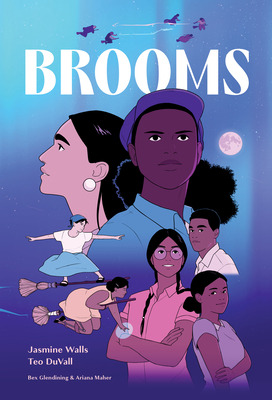
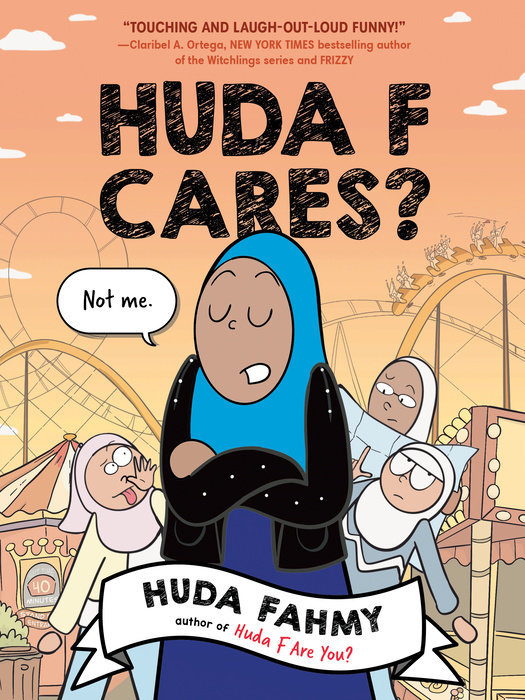
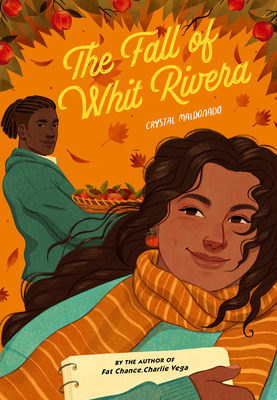

New Releases - Week of Oct. 9, 2023
We have history, fantasy, a contemporary rom-com, a memoir, and a retelling this week. It's quite a range in just four books. Does anything catch your eye?
Brooms by Jasmine Walls
Levine Querido
It’s 1930s Mississippi. Magic is permitted only in certain circumstances, and by certain people. Unsanctioned broom racing is banned. But for those who need the money, or the thrills…it’s there to be found.
Meet Billie Mae, captain of the Night Storms racing team, and Loretta, her best friend and second-in-command. They’re determined to make enough money to move out west to a state that allows Black folks to legally use magic and take part in national races.
Cheng-Kwan – doing her best to handle the delicate and dangerous double act of being the perfect “son” to her parents, and being true to herself while racing.
Mattie and Emma — Choctaw and Black — the youngest of the group and trying to dodge government officials who want to send them and their newly-surfaced powers away to boarding school.
And Luella, in love with Billie Mae. Her powers were sealed away years ago after she fought back against the government. She’ll do anything to prevent the same fate for her cousins.
Brooms is a queer, witchy Fast and the Furious that shines light on history not often told – it’s everything you’d ever want to read in a graphic novel.
The Fall of Whit Rivera by Crystal Maldonado
Holiday House
Frenemies Whit and Zay have been at odds for years (ever since he broke up with her in, like, the most embarrassing way imaginable), so when they’re forced to organize the fall formal together, it’s a literal disaster. Sparks fly as Whitney—type-A, passionate, a perfectionist, and a certified sweater-weather fanatic—butts heads with Zay, a dry, relaxed skater boy who takes everything in stride. But not all of those sparks are bad. . . .
Has their feud been a big misunderstanding all along?
Blisteringly funny and profoundly well-observed, The Fall of Whit Rivera is a snug and cozy autumn romcom that also tackles weightier topics like PCOS, chronic illness, sexuality, fatphobia, Latine identity, and class. Funny, honest, insightful, romantic, and poignant, it is classic Crystal Maldonado—and it will have her legion of fans absolutely swooning.
Huda F Cares by Huda Fahmy
Dial Books
Huda and her sisters can’t believe it when her parents announce that they’re actually taking a vacation this summer . . . to DISNEY WORLD! But it’s not quite as perfect as it seems. First Huda has to survive a 24-hour road trip from Michigan to Florida, with her sisters annoying her all the way. And then she can’t help but notice the people staring at her and her family when they pray in public. Back home in Dearborn she and her family blend right in because there are so many other Muslim families, but not so much in Florida and along the way.
It’s a vacation of forced (but unexpectly successful?) sisterly bonding, a complicated new friendship, a bit more independence, and some mixed feelings about her family’s public prayers. Huda is proud of her religion and who she is, but she still sure wishes she didn’t care so much what other people thought.
Realm of Wonders (The Queen’s Council #3) by Alexandra Monir
Disney Hyperion
Jasmine thought that she had earned her happily ever after when she and Aladdin defeated Jafar. Then her beloved father dies and, overnight, all her plans for the future change. Instead of her wedding, she’s now planning a funeral and a coronation—her coronation, to become the first woman to rule Agrabah. Jasmine has always been headstrong, but for the first time in her life, she finds herself faltering.
Then from beyond the grave, her father seems to pass along a message: Someone is coming. She must find the book. Before Jasmine can figure out what that means, her claim to the throne is called into question.
Her father’s old counsellors decree that the best way to determine the true ruler is a tournament; a series of tests, each one increasing in difficulty—and danger. Now, with help from the mystical Queen’s Council, Jasmine must assemble her own team of advisers, win the tournament, and uncover the mystery of her father’s last message, so she can prove to her people—and herself—that she deserves to rule Agrabah.
35 notes
·
View notes
Text
Concerned rambling about my big kid, also under the break.
My kid's social studies teacher does not like him. I have a child who is easy to dislike if you are not invested in getting to know him and his peculiarities. As he moves up into middle school and high school and has many more teachers who have him for just a short amount of time per day, this is going to happen more and more often.
My kid needs extra support in the form of written instructions for all assignments, and that is something that will need to go into his IEP next year. He also gets overwhelmed easily and is unable to explain homework assignments to us sometimes, nor is he always able to bring home assignment instructions. Sometimes because the instructions are oral and sometimes because they're written but he's lost the assignment page. There's also the problem of every teacher using a different app on the iPad for various assignments, and I have no idea how to access them, and he can't always tell me.
My child is more work than many teachers want to deal with, but he also has documented disabilities and needs to be appropriately accommodated. He is not being lazy or defiant. He is overwhelmed, disorganized, and distracted. He's bored in class and acting like it not because he's bad but because he has ADHD and poor social skills.
I need to work on getting a thicker skin because teachers are going to be curt and rude to me because they don't like dealing with my kid. And I will need to learn how to tolerate that and communicate with them anyway so that my child can have the tools and accommodations he needs.
The problem with my kid is that his disabilities are not immediately obvious. So teachers have the same expectation from him as other children. But he is just not at the same level, and he needs extra support. Some teachers really, really get it, and they go out of their way to support him, and I am so grateful for them and teachers like them. I know it takes extra effort to teach a child like mine. I know teachers are overtaxed and unsupported. But my kid deserves an education and is legally guaranteed to have one.
Yesterday, at his robotics club presentation, he had a meltdown in front of his club and all the parents because he felt like the kids in the club weren't listening to him. They probably weren't. My big kid can be abrasive and terse in communication style. He's more concerned with getting rules exactly right than hurting someone else's feelings. This is just such classic autistic behavior imo. It's not something he can help, but it makes him unlikeable to children and adults with neurotypical social skills.
When he was beginning to meltdown, I did not intervene because I know from lots and lots of experience that intervening when he's emotional escalates rather than de-escalates his behavior. He has to regulate himself, and then once he regulates we discuss what happened and try to make plans to handle similar situations differently in the future. But what it looks like to others, in the moment of his meltdown, is that I'm not parenting him. And then people think I'm a bad mother, when what I am is a careful, perceptive parent who is teaching him how to advocate and care for himself and make better choices for the future. I also always validate his emotions. Even if they don't make sense to me, they are valid to him!
Yesterday's meltdown was tough to witness, but he pulled himself out of it within minutes, was minimally disruptive, the event was able to continue without him, and then he was able to calmly walk away afterward. For my kid, this is a success.
But what teachers and parents and other children see is a disruptive, bad child. And I will have to deal with that alongside him. I will have to work with teachers who don't like him. It's all so exhausting--especially for someone who would rather die than draw attention to myself--but it's necessary, and I'm doing the right thing. And I'm not going to punish my child for a meltdown that he can't help because he's autistic.
Good lord, life is difficult sometimes.
14 notes
·
View notes
Text

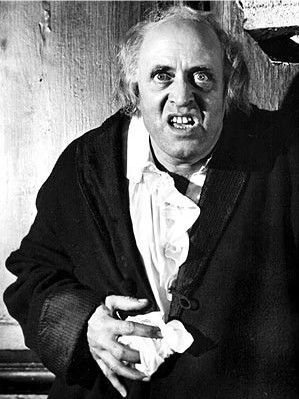


9th October 1900 saw the birth in Edinburgh of Alastair Sim, the actor best known for his character and comedy roles.
He was the youngest of Alexander and Isabella Sim's four children. His father was a tailor who owned his own shop on Lothian Road, it is still a shop selling running gear nowadays.To use a suitable phrase for his father, I like the jib of the man, Alexander was one of a group of professional people in Edinburgh who noted the plight of wounded Veterans returning from the front who had little or no prospects of suitable accommodation or employment ahead of them. They founded the Scottish Veterans Garden City Association during the 1st World War and, under the chairmanship of Lord Salvesen, paid for the construction of houses for the use of returning servicemen.
Alexander Sim was offered, but refused, a knighthood.
For a time, the family lived above the shop, but as Alastair entered school, the business picked up enough that they were able to move to a house in Craigleith. Young Alistair was educated at Bruntsfield Primary, James Gillespie's High School and George Heriot's School. He worked for his father then another Edinburgh tailor but showed little aptitude and decided to enter Edinburgh University, studying analytical chemistry, but his further education was cut short when he was called up to the army. After the war he returned home and announced to his parents he was going to take up acting, this wnet down like a lead balloon and there was a falling out, Alistair left the family home and spent a year in the Scottish Highlands with a group of jobbing workers.
On returning to Edinburgh Sim took post in the burgh assessor's office. In his spare time, he entered poetry reading classes, winning the gold medal for verse speaking at the Edinburgh Music Festival.This led to him taking a job as a Fulton lecturer in elocution at New College, part of the University of Edinburgh.
Alastair Sim began working as a stage actor in 1930, taking on minor roles. His deep talent was soon discovered, and he was cast as Othello that same year. In 1932, he met and married Naomi Plaskill, his muse and wife for life. The couple had one child, a daughter named Merlith. It wasn't long before Sim moved to films in supporting roles. One of his more memorable characters was that of Detective Sergeant Bingham in the film series Inspector Hornleigh. His on-screen presence was so dominant that he has often been credited with "stealing the scene" from the film's star actors.
Throughout the 1940s, Sim was cast in several lead roles; he starred in the thriller Green for Danger, the comedy The Happiest Days of Your Life and Alfred Hitchcock's Stage Fright, among other major films. One of Sim's better-known portrayals was that of Captain Hook in the production of Peter Pan, a role he reprised six times during his career. In a national cinema poll in 1950, Sim was voted the most popular film actor in Britain.
I think quite a few of us will remember Alastair Sim in a slightly different role to those I have already pointed out, growing up before we had all the TV channels we have now and watching the old black & white films and the classic Belles of St Trinians where he played headmistress Millicent Fritton.
Looking through his other roles, I spotted he played the notorious Dr Knox, not once-but twice. For those who don't know, the doctor of note was a professor of Anatomy at Edinburgh University, he paid Messrs Burke & Hare for fresh cadavers to demonstrate the human anatomy at the University.
I mentioned Alistair's father refusing a knighthood, and it pleases me to tell you he too refused the offer of becoming Sir Alistair Sim in the early 70's.
He died of cancer in August 1976, insisting that his body be used for medical research - and that there should be no memorial service for him. His widow lived until 1999; she published a memoir, Dance and Skylark: Fifty Years with Alastair Sim in 1987. There is a plaque, commemorating Sim's birth, outside the Filmhouse Cinema in Lothian Road, Edinburgh, only a short distance from where he was born above his father's shop.
35 notes
·
View notes
Note
January OTP Prompts:
Old bookstore on a cold day for Sterek
Happy New Year! 🤍
mountain man
sterek, bookshop au, fluff
“Mountain man is here,” Scott whispers in his ear, hands gripping Stiles’ shoulders as he carefully moves behind him in the narrow space. “Biographies.”
Stiles nods and glances around the small cafe space. The tables are occupied, but no one looks like they’re about to need a second cup, so he feels free to announce, “Just going to go get a new bag from the back,” to Kira, despite having just done that no more than thirty minutes ago.
But Scott must have also said something to Kira because she just nods with a grin, and Stiles leaves the counter before fate can intervene. And if he can just see into the history section from the very edge of the double doors that lead into their dismal excuse for a kitchen, that’s no one’s business but his own.
He stays there until Mountain Man leaves the shop.
---
Mountain Man is an enigma. Stiles had been certain, the first time he’d walked up to his counter, that he was going to be gruff and rude, like the assholes from the bank across the street that treat the small space like their personal conference room and bark out orders without any regard to the fact an actual person was taking them. But his eyes—which are so beautiful that Stiles wrote four atrocious poems about them in his Intro to Poetry class—had been kind, and when he’d given his order he’d said please twice, and Stiles had fallen head over heels.
In fact, the majority of Stiles’ assumptions about him have been proven incorrect, so he supposes that out of the two of them, he’s likely the rude one. He’d figured Mountain Man was there for the coffee, only to be surprised when he caught a glimpse of the man at the registers an hour later with a stack of books in his hands. His assumption that he was only getting the latest quickly read and easily digestible thrillers was shown to be wrong when Kira spotted him buying classics the next month, and then Stiles stopped assuming anything about him at all.
Except, of course, for the fact that he lives up in the mountains that surround their small little college town (the boots and beard give that away), works with his hands for a living (always calloused), is somewhere in his late thirties (laugh lines around his eyes, silver beginning to streak through his beard) and has no significant other—though that last one might just be wishful thinking.
----
“Stiles, could you go see if Allison can trade us for some ones?”
He takes the twenty dollar bill from Kira and steps out from behind the counter. The store’s been dead all day, he’s pretty sure there are still a stack of ones sitting in the register. “You’re not fooling me,” he says, and she grins back at him.
“Who said I was trying to?”
Allison’s up at the front register, leaning her elbows on the counter and texting, phone in front of her face. It’s an act that would get the rest of them written up, but Allison’s clearly fine with taking advantage of the fact that her parents own the store and Stiles can’t really fault her for that. If his dad were running it he’d probably delight in kicking people out the moment they asked if someone could help them find a book with a yellow cover.
And in front of Allison, browsing the small section of puzzle books and journals, is Mountain Man.
“Hey hey, boss lady,” he says. There’s no way to angle himself to keep Mountain Man in view, but if he bends over enough he can sort of see his reflection in the poster-covered glass windows.
She sets her phone down and grins at him, snatching the bill out of his hand. “Hello yourself, coffee boy. No token of your appreciation this time?”
“Kira’s making it as we speak,” he says, and she shakes her head when he uses his in-store radio to quietly order it. “But if you could be so kind in the meantime—”
“You’re such a dork,” she says fondly, pushing a stack of dollar bills into his hand. “Go get my coffee, I’m practically asleep up here. I told Dad no one would come in today, there’s three feet of snow on the ground.”
“Maybe someone could convince him to close early,” he says, walking backwards out of the section. His gaze strays to Mountain Man and when their eyes meet, his heart starts beating double-time. He glances down at the books in his hands—a few that Stiles recognizes from the YA section, even more from the display of queer novels that Allison had set up for Valentine’s day. “Good selection,” he says, “Red, White, and Royal Blue was good,” and spins around in his haste to get back to the cafe.
Kira’s holding a cup in her hand, but pulls it back towards her when he flings himself over the counter. “What?”
He needs water. Or to plunge himself into a snowbank to cool his overheated face. “Please remind me that straight guys read gay love stories too so I don’t go do something reckless.”
“That hasn’t been my experience at all,” Kira says cheerfully, pushing him upright and handing the cup over. “Go get his name, at least.”
Mountain Man is gone by the time Stiles gets back up there.
---
He stashed his marker somewhere. He knows he did, he always has it to write the orders on the cups, and most of the time he puts it back in his apron pocket—except when his pockets are full of the bags of espresso beans he was supposed to restock before the swarm of banker bros took over the place. He’d taken their orders, empties his pockets, and then promptly spent the last five minutes looking for his marker, which seems to have grown legs and walked off on its own.
A throat clears above him when he’s crouched down checking the overflow shelves under the register for the third time unsuccessfully, and admitting defeat, he straightens up.
Mountain Man is in front of him.
“Hey,” he says, instead of welcome to Argent Books like he’s supposed to. “Whatcha havin’?”
“Medium vanilla latte, oatmilk, please,” Mountain Man says. He hands over cash, much to Stiles’ continuing dismay, because it would so much easier to get his name from a card, but doesn’t leave when Stiles calls the order to Kira and slides a cup along the counter. He just stands there, look of discomfort on his face, until he says, “Did you really like that book?”
Stiles raises an eyebrow.
“The, uh—Red, White, and Royal Blue,” Mountain Man says. “Did you really like it?”
“Yeah,” he says, and then, “well, no, it’s not really my thing, but everyone else liked it. I haven’t actually read it, I started the first chapter but I wasn’t in the mood for any kind of coming of age story and the romance—maybe if it were like, a gay detective novel, that shit would be cool. Or sci-fi—have you read This is How You Lose the Time War? That was good.”
He’s about ready to fling himself into the dumpster out back when Kira appears at his side, handing the cup over with a grin and Mountain Man, clearly sensing an opportunity to get away from Stiles, thanks them and walks away.
“Why don’t you go take inventory in the back until you don’t look like a tomato,” Kira says kindly, patting his flaming cheek, and he doesn’t need to be told twice.
The afternoon picks up and although Stiles doesn’t forget about the awkward encounter, he at least puts it out of his mind—until his phone buzzes in his apron pocket and he picks it up, expecting a text from Scott or his Dad, and promptly drops it straight onto the floor.
“Oh,” Kira says, peering around his shoulder at the picture of This is How You Lose the Time War laying on a couch, folded flannel blanket underneath. “Did I tell you I gave Mountain Man your number? I wrote it on the cup—you were never going to get around to it!” she says, whacking his arm. “And I’ll take your gratitude any day now, he’s clearly interested in talking to you, though sometimes I can’t imagine why.”
He only spends a minute hyperventilating before leaving the cafe area, snatching a familiar pink book off a display table, and taking a picture in return. Thought I’d give this another try, he writes under it, and follows it up with maybe we could meet up for coffee and talk about them.
He presses send before he can think about it, and breaks into a grin when the reply comes back quickly.
I’d like that.
He’ll worry about getting Mountain Man’s name some other time.
118 notes
·
View notes
Text
dangerous romance: main couple mania ep. 1
so i love how sailom's instroduction is this is a budgeting king, in debt eating stolen rice porridge. he has a very pre-kinn broke ass porsche-chay dynamic with his brother (?) which is very sweet and also means it won't last five minutes.
oh okay so we get this ship sailing with a wall slam and a classic "do you understand my father funds your scholarship you poor piece of trash" and alksdflkfj
i know i am supposed to see sailom as the victim but he is like full on pete-ing this. he never breaks eye contact. he is like daring kanghan to escalate with his entire body and kanghan did not just go full "since you're my class mate i will be generous and forgive you if you get down on your knees" like that is a) spicy as fuck what the hell and b) going to backfire so hard
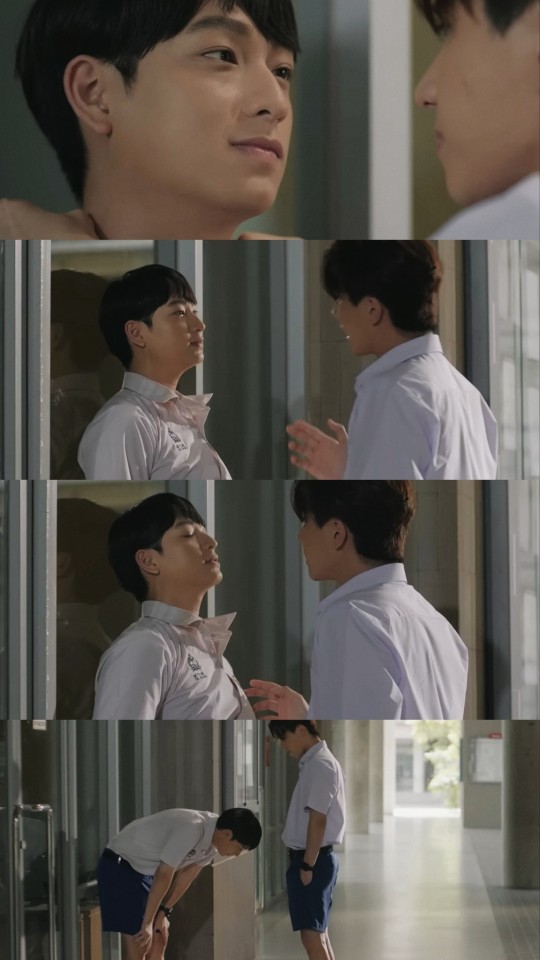
HE DID NOT JUST BOW 90 DEGREES JUST TO SPIT ON KANGHAN'S SHOES AND WALK AWAY WITH A SMIRK
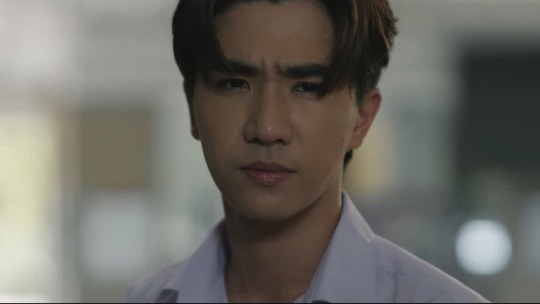
he is puzzled by both sailom's actions and by what is happening inside his uniform shorts
honestly, kanghan is the villain here but i struggle to take him seriously as the bad guy because perth a) always looks like he is about five seconds away from bursting into tears and b) has bangs that form a literal heart. no matter how nasty kanghan tries to be - and he tries a lot - the inherent bitch baby-ness just shines through.
literal heart bangs what did i say
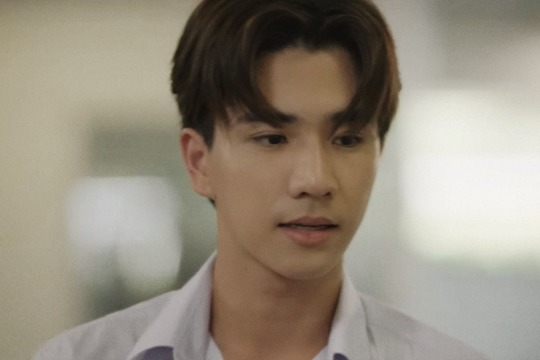
this entire car shop sequence is just pure gold for so many reasons. 1. kanghan shows up in his business leather pants looking like he walked off the set of enhypen's blessed-cursed music video and he's driving a mercedes. like honestly, with all that talk i was expecting a lamborghini.
2. sailom's boss actually like... needing some evidence instead of just bending over backwards to please a rich client
3. sailom fucking uno reversing that credit card sneak and humiliating kanghan with the smuggest lil good boy smile and THAT is why chimon is the ultimate snake-cat like he has a face made for scheming.

i am really loving sailom because he keeps his head, is really resourceful and will not take any shit. boy does not hesitate to drag this bastard for filth every chance he gets, beating kanghan in his own game without ever stepping down from the high road.
ooh, we are meeting kanghan's family and they are... both not as trash but also as trash as i expected? like i kinda thought more mafia vibes but if laws of attraction - and real life - has taught me anything it is that politicians are garbage.
on the surface his dad seems almost a jolly good fellow but the conversation with this random girl just confirmed there is something so much darker lurking under the surface. as much as it hurts to have a hyper critical parent, having one who has seemingly completely given up on you can be just as bad.
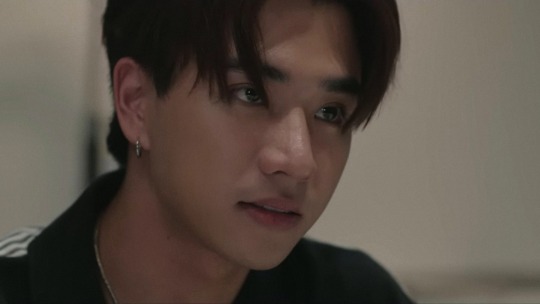
he's basically been called stupid twice in under five minutes. someone save him.
sailom will not be fooled by a shady ass phone call and neither will he leave a friend behind. this boy will not be distracted by tits with a side of toast. he is a man on a mission.
the way i gasped when i saw this court set up and i have so many questions. do the students just have a cardboard gotham in the basement or - based by the fact we see loose boxes and a shopping cart - did kanghan build this just to prove how big his dick is to sailom ???

chimon's acting is honestly a+ and he is carrying this show. the tension! the absolute rage that is bleeding through! the way he doesn't have to go big with gestures and expressions to convey everything sailom is feeling perfectly - and not just that. you know what sailom is feeling AND you can see his brain working.
kanghan, sweetie, you might want to take a moment and reflect on your obsession with getting this boy out of his clothes and making him kneel.
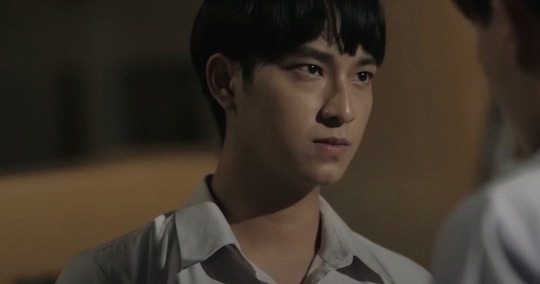
not gonna lie, i kinda saw this move coming because tropes but god was it satisfying :D the reactions of kanghan and sailom's friends are hilarious (10/10 i am evil tea, he totally ships it) and then the camera pans and you can see all these bystanders just standing stock still, filming giving major horror movie vibes and aaaaaaah
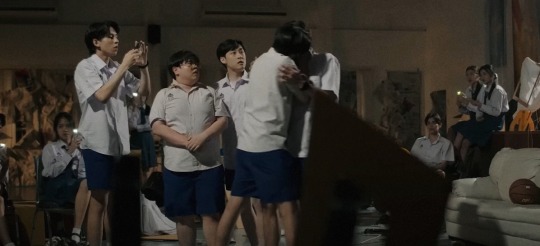
side notes:
i love how his best friend is just "auto." like his parents were "we are poor, naming the kid a vehicle will be fine. no need to bring brands into it."
auto's mom is an actual queen
the teachers are so fucking infuriating but also, that is kind of a sad truth? even when it's not like RICH rich people involved. like for too many adults, it is easier to it off as kids being kids and boys being boys over having to deal with the why and the parents and the drama of it all.
i was bullied in school so like this bubble tea waterboarding makes me feel some type of way? like some of the bullying is very oof-spicy-trope but a lot of it is actually cruel and i really wouldn't recommend this show to anyone who gets triggered by stuff like school violence.
#dangerous romance#dangerous romance ep 1#kanghan x sailom#episode recap reaction whatever#this show is gonna become a guilty pleasure i can tell#can't wait to witness kanghan's journey into being pathetic
26 notes
·
View notes
Text
NPC Spotlight :: The Vaudeville Fellow before Vox & Pentagram City's Golden Age of Theatre | Ira & Claude
Thanks @arachn0philia for the inspiration of the rivalry!
Vox isn't the first media Overlord in Hell, that much is obvious with Alastor's presence alone. What slightly less people realize, is they're not the first set of media Overlord rivals either.
Ira and Claude were the last set, and were, themselves, one of a long line of them. They're point of contention, rather than the news, as their predecessors disagreed on, was the theatre. Claude was born in 1877, and grew up in a family that were performers. His older brother became a circus performer, his parents found their niche as some of the earliest Vaudeville performers when the genre was just beginning to make its way in America.
He could dance, sing, play a handful of instruments. He was a multi-talented individual, who spent most of his life as a travelling performer. He spent more time in a theatre than a house, and learned a lot of his basic skills in tandem with it. He needed to read to read scripts, he needed math to balance the troupe's books. And really, nothing ever changed for him, he just went from ferrying props back and forth to being a performer, and then a headlining act.
In 1916, he died-- it might have been malicious, it might have been an accident, but something went terribly wrong with the stage curtain where he was performing, and dead went the Vaudevillian when it collapsed on him.
He woke up in Pentagram City with a new face-- a theatre mask, which while not traditionally something he used in his acts, also was fine enough! He picked up a dab hand at dramatic makeup and little appliques to change each given look.
He didn't set out to be an Overlord, really, he didn't, but the variety shows welcomed everyone and so his little section of the city, and it really was small! Just a few streets, welcomed in circus performers who no longer had their circus, and the other Vaudeville ones, the burlesque shows, the cabaret. It was all entertainment, and this is the point of contention he found with Ira.

Claude wasn't the only theatre Overlord in the early part of the century. Isidoro (but as that was a name a toddler had to live up to, he mostly went by Ira) had been born fifty years earlier in 1827, and to a relatively well-off Italian family. He was educated in all the classics and their languages, and the scripture. He could play instruments and dance as a gentleman should, and most importantly, he could sing. When he was sixteen, his education tilted properly into professional stagecraft.
For Ira, the goal of theatre was only ever half for entertainment. The stage was a place of wonder, where stories that could cross border and language and space could be performed. Tragedies could make people cry, and in no place was that as clear as the opera.
Ira, throughout his tenure, played all sorts of roles-- he played the young leading man, when he got older, the father, he directed, he was beloved during a golden age of the medium. While he stayed, primarily, in Italy, he travelled to France, and to Germany, he performed across Europe.
And then, in his own tragic twist of fate, found his own at the end of a rope, caught up in the rigging in 1881. In Hell, he looked like an Opera dei Pupi marionette. His limbs hung strangely, he moved in ways alien to a biological form-- his face was painted, and in Hell, he became the foremost Overlord in charge of the theatre.
He thought it best in its 'purer' forms-- opera, of course, but also the more naturalistic, realist plays, Shakespeare and all the great classics. He appealed to the sinners who craved something... higher class than what was usually on offer, and even the Ars Goetia could sometimes be found to frequent his theatres.
And then came Claude, who peddled cheap comedy, and a scandalous laugh to the masses, who charged a pittance for entry.
Their rivalry was never as... explosive as their successors would be, and took more the form of defaced posters, and shows set on the same nights. Claude's acts would have pointed jokes-- and perhaps, it would have gone the way of Vox and Alastor, but instead they ended up striking up, at least part of, a friendship. Claude would attend the operas, and even if his face, and his clothing was clearly costume, they found a middle-ground in the Commedia dell'arte, and in the late 1930s, a handful of plays were performed as a collaboration between the two of them.
There was, perhaps, some value to the others perspective, and when they weren't spitting audiences between each other, it strengthened both of them.
Sadly, the theatre, as much a place of family and camaraderie, is also one of petty jealousy and people who believe they are more talented than they are. In 1953, Ira was killed by one of his actresses who believed she had been scorned and passed over again, and again, and who had plotted with her newest beau that if he was out of the way, that they could take over and make her a star.
If it hadn't been for Claude's tempering influence, Ira would have become one of the jars in Sloth, as it was, he found himself in Heaven, and very little changed.
As for Claude, in the first extermination following Vox's death, very shortly after his fall, Claude was caught up in it. He had always just sort of been a fine enough fellow, and when he ended up at the pearly gates, knew enough to lie to not draw any attention to himself and his arrival from Hell, not very pious, but a useful trick for a performer to pull.
The power vacuum he left was a perfect opportunity for Vox, and so ended Hell's golden age of the theatre.
He and Ira's rivalry remains in Heaven, but its playful, and in much the same way that Claude accepted everyone in Hell, a lot of the children who end up in Heaven without parents become regulars where he is.
#*personnel file (hc)#Claude's been kicking around as an NPC since the blog start#He didn't have a name or more than that he died!#Vox doesn't know his name#Ira is new today#The particular theme of Vox and Al's rivalry is theirs#but the actual existence of it is just retreading previous duos
4 notes
·
View notes
Text
Formula for a Crime Scene - Ch 2
Circumstances leave Artemis Fowl and Danny Fenton living in Gotham to attend Gotham Academy with Damian Wayne. More circumstances lead to the three boys becoming unlikely friends, and eventually something more. Now the three must navigate a world of superheroes, fairies, and ghosts together.
The worldbuilding of this fic was co-written by my friend, @half-dead-ham, and myself! They will be posting their own Crime Scene (The name of the ship as dubbed by another friend, @thetoyboxs) fic that will have similar plotlines, as we made them together! So behave!
[Ao3 Link Here]
} ~ – ~ {
Danny hummed, adjusting his backpack as he walked outside of the school. He looked around, watching the other students hop in cars before walking away, heading for his hotel.
Now why was he in Gotham you may ask? Why was he attending Gotham Academy?! Well that could be summed up with one word!
Vlad.
Vlad had come over to ‘visit’ Dad a couple of times. Every time he talked about this fancy academy he had donated to and how great it was. A perfect school for young geniuses, that held a great standard of discipline.
It was annoying.
And then when his parents complained once again about Danny’s grade, Vlad acted. Talked about how unsafe Amity was and it wasn’t any surprise that Danny was doing so horribly. Amity Park was so unsafe, especially since its protector was the wretched Phantom. And then he offered for Danny to go to Gotham. And his parents agreed! They agreed like the fucking fiddles they’d been played as.
So now here Danny was. First day of school done with and heading back to the stupid ass penthouse apartment thing Vlad had bought for him.
At least the owners of the apartment were nice. The old lady gave him cookies when he’d finally moved in.
He sighed as he unlocked his door, stepping inside and locking it behind him. Gotham is safer, his ass. It was more dangerous because humans didn’t get affected by ecto-weaponry.
Danny sighed again, dropping his back and the uniform jacket by the door before flopping onto his couch. School was tiring. A couple of the kids were cool, like Quinn and Hannah. Quinn was an enby in his English class who said “Mood” when he slammed his head on the desk. They had a fun conversation about their mutual hate of classic literature. Then Hannah was in his P.E. class.
Honestly P.E. wasn’t as bad as he thought. They had to change, despite it being the first day, but no one said anything about his scars. Then again, Danny had noticed a bunch of scars on other kids too. Just goes to show how hellish Gotham is. Hannah had walked up to him after he got out of the lockers and asked him where he was from. And respected when Danny dodged questions. Pretty chill kid.
Danny shifts when his phone buzzes, sitting up to grab it from his pocket. He leans against the armchair of the couch as he opens his messages.
Tucker: Yo dude how was the first day?
Danny smiles as he replies.
Danny: Ey.
Same old same old.
Danny: I stopped this one kid from getting in trouble cause some dickhead picked a fight with him
Tucker: No ignoring bullying?
Danny: I mean.
It’s not like anyone knows who I am.
Danny: Can’t pick on me for being a Fenton freak here.
Tucker: Good point.
Tucker: Wish I could convince my parents to let me join ya.
Being that close to WE sounds like heaven.
Danny laughs.
Danny: For you maybe.
Danny: I had to get a special orientation featuring like a million safety plans for Gotham’s various problems.
Tucker: Speaking of which, you going out as Phantom?
Danny: Nah man you know the rule.
No metas.
I may not count but I doubt Batman would care.
Tucker: Eh. Isn’t Signal meta?
Danny: Doesn’t matter.
No Phantom-ing in Gotham.
Any news on Vlad?
Tucker: Nothing new.
Honestly I’m hella suspicious, man.
Tucker: He’s too quiet.
Tucker: Especially after kicking you out.
Danny: Just keep digging Tuck.
Tucker: Yeah yeah.
Anyways see ya man.
Lancer gave us homework!
On the first day!
Danny laughs, texting goodbye. He gets up, heading over to his lab. Honestly the fact Vlad allowed him to get one was wild. But he’d be damned if he didn’t make use of it.
Right now he was trying to figure out how to minimize the original Fenton thermos. He figured he could probably make it the size of a lipstick, like the lazer blaster. But his first, like, three tries ended up exploding so Danny decided he was going to do something different this time.
Danny knew engineering. Its why he has a fucking scholarship for it. But he had zero fucking clue all the materials and know how on his parents creation. They were very much the “lets just do it until it works” type of people.
Which meant he essentially needed to completely recreate the original thermos from scratch before he could actually work on minimizing it. He’d gotten a good outer shell together, but right now he was trying to replicate some of the circuitry. Which wasn’t going so hot.
The memories of how he, well, died made the occasional stray sparks while staring at the open circuit board hell on his nerves. But he was slowly managing it better. He shifts, readjusting the board as he moves the soldering iron he was using.
He perks up when he hears the doorbell ring, taking a moment before realizing that it was the superintendent’s wife. He smiles, putting down the circuit board and welder before heading for the door. He backtracks for a moment to actually turn the welder off before making it to the door.
He opens it up, smiling at the old woman. “Hey Mrs. Abringer. What's up?”
Mrs. Abringer smiles as she offers a box. “I made some cookies again and figured you’d want some. I’m sure you could use them after getting through your first day of school.”
Danny chuckles, reaching out and taking the box. “Thank you. Your cookies are always great.”
Mrs. Abringer nods. “Thank you dear. And remember, don’t be afraid to ask for help.”
“I won’t Mrs. Abringer.” Danny closes the door as she walks away, locking it again.
He moves to the kitchen, stepping over some trash that escaped the can and setting the box on the table. He looks around, sighing before moving to clean up.
#danny phantom#batman#artemis fowl#dp x dc#dp x artemis fowl#dp x af#dc x dp#dc x artemis fowl#dc x af#dp x dc x af#danny phantom x batman x artemis fowl#CrimeScene#CrimeScene ship#danny fenton x damian wayne x artemis fowl ii#danny phantom x robin x artemis fowl ii#polyamorous#polyamorous ship#they're gonna take over ecistence#maybe#danny fenton#damian wayne#robin#artemis fowl the ii#this is beta read#but we're both adhd#so it wont be perfect#we die like danny fenton#formula for a crime scene
35 notes
·
View notes
Text
HC for Reigen, his sibling, and his childhood
Reigen having a sibling is a pretty common HC!! Most headcanons with Reigen’s older sister/Reigen having a sibling portray the sibling as the “good kid”/“golden child” compared to his loser ass, but mostly based on…….projection from my own childhood……. I’d like to think it’s the opposite. IMO, Reigen was the “good kid” while his sibling was the one who Reigen’s parents probably worried about more
I think it’s quite a common hc too that Reigen’s parents were strict/emotionally neglectful/had unrealistic expectations of their kids, which I totally agree with. Now, here’s some projection and traumadumping to illustrate how children with these parents might grow —
There are a couple ways children survive living with overbearing/strict parents — by running themselves ragged trying to please them, or by accepting the frequent arguments/groundings/bans as part of life. I think Reigen (as I did) chose the former, and his sibling (as my sibling did) chose the latter.
My childhood went something like this: I was seen as the “unproblematic child” with a tendency to be a fast learner wherever it counted. I thrived off being good at things, and being told I was good at things. Classic “you can do anything you set your mind to” child. I wasn’t perfect by far; I just developed a sixth sense for getting away with things — lying, “reading” my parents, finding loopholes, scheduling “coincidences”, and a healthy amount of crying to guilt-trip my teachers.
My sibling, on the other hand, was the opposite — they skipped school, never cared to find any extracurricular clubs, and were always at odds with my parents. They made friends quick though; where I tended to only befriend people I was in the same class/club with, my sibling somehow always had a web of friends spanning multiple schools. Crucially, despite how often they fought with my parents, my sibling almost never lied, instead choosing to go “Yeah, I did that. So what?”, accepting the ensuing arguments.
Because of that, we grew very differently. My sibling is so much more open and sociable, hating environments where he’s made to act more “formal”/“professional”, figuring out early on that you don’t actually need to continually convince people that you matter. On the other hand, I think I’ve habitually covered up any single iota of genuineness inside me. I’m great at making first impressions but bad at actually connecting; I can’t cope with not being busy 100% of the time; I keep obsessively finding new skills to pick up because idk what else I can do. I also don’t have any good coping mechanisms for failure and rejection because, well, why would a “gifted kid” need to learn how to deal with being bad at things?* [*: sarcasm]
Does all this sound familiar?
So yes anyway. I think Reigen is Reigen because he was always good at pleasing his parents/teachers using a combination of deception/manipulation and actually being good at things, and was unable to accept failure/rejection because he’d always found a way to avoid it. And as a result of being unable to accept any outcome below the ideal, he would’ve gotten less and less honest about his own genuine emotions, eventually becoming great at presenting an “impressive” front but terrible at actually genuinely connecting with people.
And so in conclusion — LET CHILDREN BE SHIT AT THINGS. LET CHILDREN SUCK AT SCHOOLWORK/SPORTS/ETC. Literally no one was created to be perfect at everything. Allowing children to fail in a supportive environment doesn’t encourage them to “”underperform””; it makes them so much better at accepting failure and moving forward from it in a safe and non-self-destructive way. Also, forcing kids to be perfect doesn’t make them perfect — it just makes them damn good liars. Idk why this is becoming a parenting PSA from me, a single 24-year-old, but please just. Let children be shit.
#mob psycho 100#mp100#long post#sorry#mp100 headcanons#reigen arataka#arataka reigen#this rly is 90% projection#but it makes sense okay!!!!!
35 notes
·
View notes